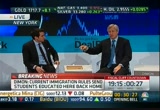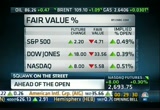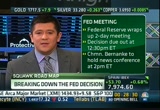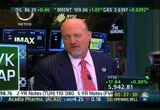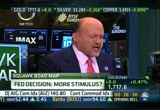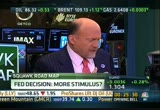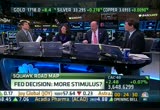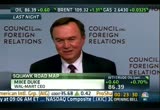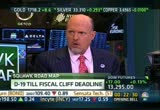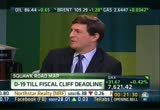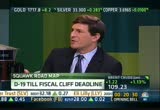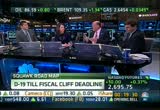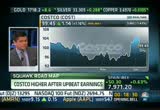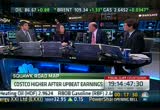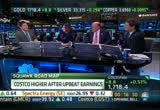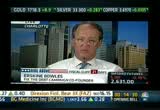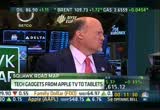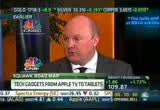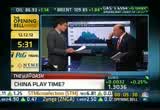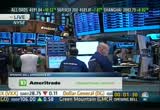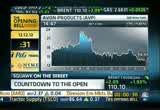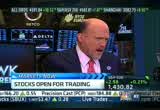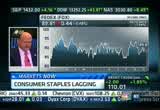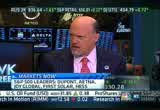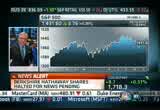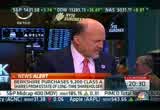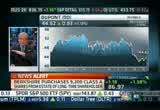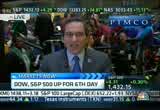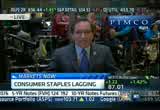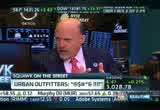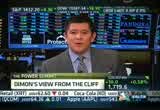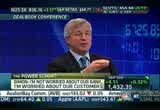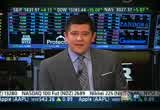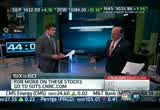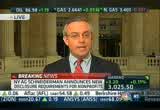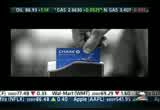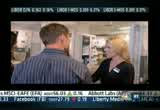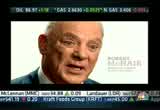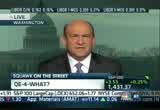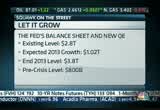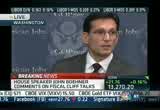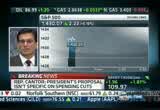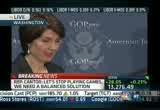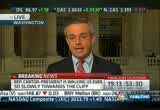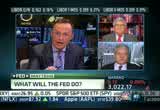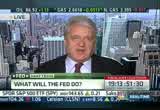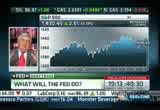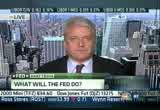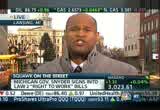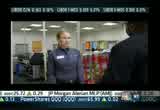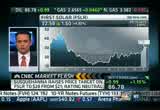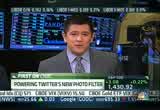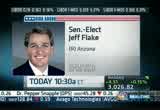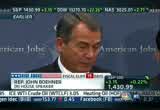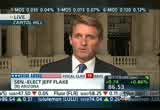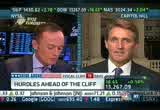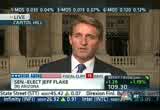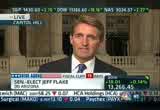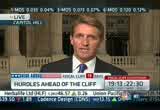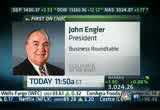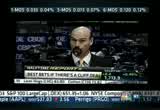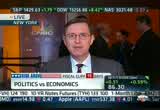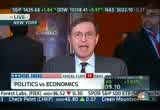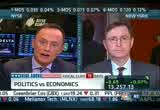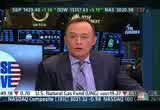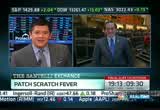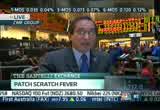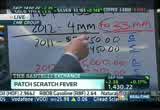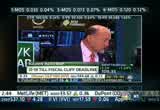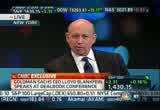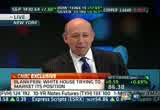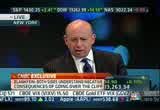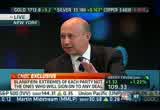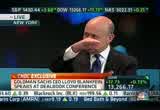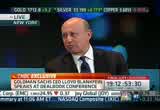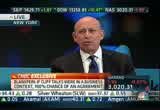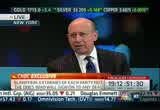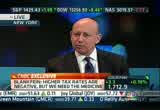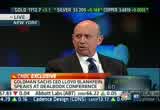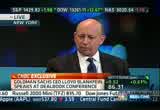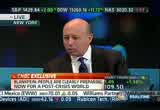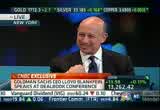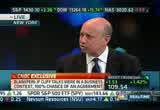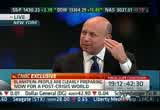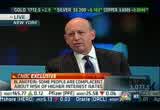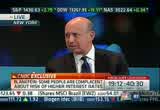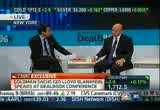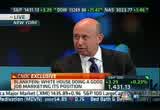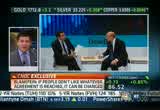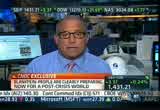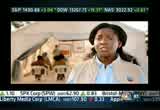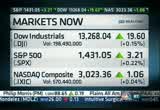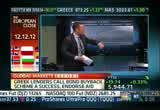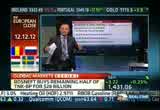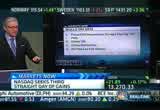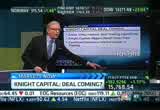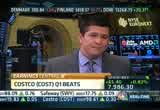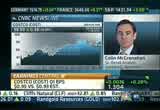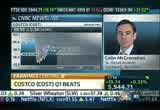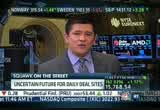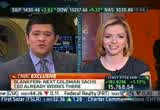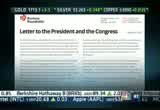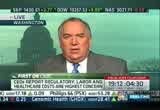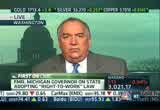tv Squawk on the Street CNBC December 12, 2012 9:00am-12:00pm EST
9:00 am
this is believable. this will drive down debt to gdp over time. that's what i mean by market credible. >> let me ask you a question about lobbying. you just advocated -- >> jamie dimon at a conference, that's the end -- with all the stuff he says about being able to petition the government and all that. how the unions get in there. >> andreson was a lot more clear. >> he's great. >> great job by andrew. make sure to join us tomorrow. that's it for us. "squawk on the street" is next. all right. with that, good morning. welcome to "squawk on the street." live at the nyse. we'll continue to monitor what jamie dimon does at the deal mark conference. we await the federal reserve statement, and news conference
9:01 am
in just a few hours. as for europe, some green arrows, despite a miss in the eurozone in production this morning. >> the road map starts this morning with, of course, the fed. expectations for revamped bond buying program. what will the economic forecast say about next year and what to make of the "wall street journal" story that says academics are driving monetary policy at secret dinners in switzer land. >> more counteroffers in the debt negotiations. it looks like corporate taxes are part of the deductions. >> costco beats by 2 cents, better sales and better sales and membership fees. >> some more reports about apple tv today. the journal said it's designing a high -- new high-resolution set. microsoft trying to widen the list of retailers that will carry the surface tablet. the fed is going to wrap up its two-day meeting. a watch is on to see if ben bernanke and policy makers make
9:02 am
a decision about the interest rates. later on, the chairman will hold a news conference, and of course, cnbc, will bring it to you live. coverage beginning at 2:00 p.m. eastern. jim, a lot of discussion about how much they are willing to do, given the tenuous nature of the talks in d.c. >> i think that this is one of those that is really at the front. things want to hear things haven't gotten worse. if it hasn't gotten worse, they'll stop buying the bonds. the competitive nature of bonds will rise at the same time the dividends will not be as bountiful. there's enough to not like that i think people will be freaked out. if he is not -- he must be opaque. he must go back to greenspan speak and say, listen, you know, on the one hand, on the other,
9:03 am
simply because he has no clue whether we'll go off the fiscal cliff or not. i'm calling for opaque, return to the old days, of we have no idea what he means. >> the headlines the next day that are literally competing headlines. >> please, go back to being unclear. >> whether the journal or the "washington post." 180 degrees. >> what did he mean? >> there's plenty for conspiracy theorists today. ties to all the central banks all around the world, they have these secret dinners every couple of months. as if the fed needed more distrust among fed watchers, right? >> i havend the privilege last r of going to a dinner with fisher, who is crucial -- you look at the diagram. this is just an alumni association that has allowed other people in. this is an m.i.t. thing. fisher is regarded as being the man who saved east asia in the
9:04 am
'90s. you know, these guys have been more than upfront that there's a club. i think it's just being written about for the first time. >> yeah. mark, the consensus is $45 billion in monthly purchases of treasuries. that's what's expected. if we don't get that, a lot of market analysts believe that the markets will be extremely disappointed. this off of a string of gains. the first five-day winning streak for the dow since march. the dow, in fact, is at, what, the highest level since october 22nd. s&p the highest level since november 6th, which, of course, was the election. we've been levitating higher that the fed will be there and the cliff deal will be reached. interesting. >> the papers read, as if we're about to have a deal. i think there's so much irony in the papers today. we've got corporate leaders saying, listen, you can raise our taxes. at the same time you have republicans who are saying, listen, we will not let taxes be raised for the corporate leaders.
9:05 am
i mean, you've got representatives fighting for who? i've come up with a new term, the silent minority of the minority. the silent majority, we had that, william sapphire talking about people not getting spoken for. there's a 2% of which there is another percentage represented by congress. it is the silent minority minority. >> i saw your show last night after you returned from washington. you did not appear to be particularly optimistic. speaking to various people from various -- from both sides of the aisle. >> i asked everybody whether they're optimistic, and most of them weren't. so i take my cue from them. there's a lot of theater down there. i'm not used to that theater. i'm used to ceos. i wrote something that i trust ceos more than i do politicians. so people hate ceos, lawyers, who's not hated. i don't know, carmelo anthony,
9:06 am
maybe you like him today? >> i think he's all right. i wouldn't drive with him, but otherwise he's good. >> these people come on and there's no give, there's no give, maybe what that really means there's give give give, i think at some face value -- >> there has been give in the last 24 hours. let's get the latest as far as the proposals back and forth at white house. the president and john boehner speaking by telephone on tuesday changing fiscal cliff proposals. reducing new tax revenue from 1.6 to $1.4 trillion over five years. but they're jockeying on who should spell out the specifics on the spending cuts. walmart's ceo mike duke expressed concerns about the fiscal cliff. >> the week before the election, only one-fourth, 25% of our core customers even knew what fiscal cliff meant. okay? one week after the election, it
9:07 am
was up to 75%. now these same customers, 15% of our customers are telling us, this discussion about fiscal cliff will affect what they spend on christmas. >> that's a fascinating read on -- >> i wonder who's doing the surveying? how is that occurring? >> greeters? >> i would be curious how they know those percentages. do they ask people at the -- >> yeah. >> and can you define the fiscal cliff? i don't mean to question the methodology, it's interesting. >> just curious. >> i think that when i was in washington, i got the sense that there were just a lot of people there who actually thought romney was going to win. and there would be no fiscal cliff because romney would get together with congress, extend every single tax break and we would all live happily ever after and not worry about the deficit and not worry about the 2%. there was a kind of, well, they
9:08 am
guessed it wrong. we started focusing on the fiscal cliff because there would not be a cliff if romney had been elected because there would have been no loggerhead. i don't know. >> interesting. mark andreson on squawk this morning saying, we'll go over the cliff. howard dean has said it for weeks. you've got the solidarity on those on the left, andreson a big-time romney supporter, saying the exact same thing, this is the best thing for the country. >> i like what dimon said in that interview. it could be really bad. >> we don't know, but why take the change. >> andreson's got the job. you should be more worried about going over the cliff and losing your job. if you say you're not worried about the cliff, you must be very rich. if you're very rich, you should not worry about -- >> if you're truly concerned about the deficits, and we've said this many times, this is a deficit reduction plan. >> but is it the right way? >> no, it is not the right way.
9:09 am
but it potentially would have an impact on actually setting us on a different trajectory. now, republicans, and many will still argue, rightly so, we're still not dealing with our spending issues in the way we need to fundamentally. to your point, it's not the way it should be done, it's not a great deal. the numbers would come down. >> remember, they did vote to this. they did agree to do this at one point. maybe they never thought it would come to this. but i think when you say you embrace the cliff, you do say, i embrace economic weakness. it was meant to be an austerity package. i was in ireland during the vote, and the vote was for having less money now, in order to get more bounty later. versus having more money now. i think you're saying, david, maybe we take pain now. that would have been the way with clinton, that's the way it worked with reagan. >> and maybe the pain wouldn't be as bad as we think. maybe the economic growth would be better so we wouldn't have a
9:10 am
recession. and then we would be on the trajectory of reducing deficits of higher taxes and spending. spending decreases, or cuts that many people want, sequestration bringing significant cuts in defense. >> a lot of the big market calls, strategist calls, has the year end 2013 at 1580, but sub1400 because the cliff is going to be choppy and tricky. >> i'm not going to disagree with that. what if we get corporate tax reform? >> and jamie dimon's right again. we're a world leader and the market goes much higher, and a rational deal i think -- will it hit the ceiling? will it change? you get a real deal. what are we going to be sitting here talking about when 3m reaffirmed, dupont bought back stock --
9:11 am
>> $1 billion share buyback. >> and how the multiples were compressed because of the fiscal cliff. now people should pay more for earnings. we go back and do what we used to do. >> we will. one way or the other, we will. >> remember when we used to talk about spain? italy? >> the good old days. spain was borrowing at 7%. >> germany went to the five-year high. we could have that, too. unlike them, our economy is not in tatters. they go five-year high on tatters. audi, good car. >> yes. good car. >> meantime, shares of costco this morning up in the premarket. warehouse retailer earned 95 cents a share in the first fiscal quarter. revenue, profit margins beating forecasts helped by rising sales. those higher membership fees did hike fees a year ago november, which doesn't happen very often. the journal today says, model looks great. the business is great. the stock is just -- people want to pay a lot of money for it, jim. >> oh, yeah, costco, those are
9:12 am
remarkable numbers. i know you did an excellent special on coastco and it seems like the execution was impressive. people want to go there. >> as gas prices come down, that helps them, given they make it a bit of a loss leader. valuation rich for your blood. >> when you go to buy a house, you see kirkland more than any other brand. you can say, jim, that's not even -- i mean, what percent -- i am a real fan customer for kirkland. i think it's replaced a lot of people's idea of what a brand of product this is. oh, kirkland. well, isn't that a great brand. that's something that dollar general doesn't have. >> the membership fees, to your point, were up 14%, revenues on the fees this quarter. that's a tremendous increase, given it was the hike in november. it's not just the jump in revenues. because year on year, you
9:13 am
know -- >> did anyone say no to that price increase? did anyone rip up their card and say, i'm not paying the new price for costco? >> even if they did, their renewals are so high, the rate, i want to say close to 90%. i mean, it would have been on the margin. but once you're addicted, as you said -- >> i go there. it's an issue, you have to have room in your house. and i found when i had an apartment, it was not that valuable. >> it's not practical for a new york city dweller, for instance. >> when you get houses, you see the mexican properties? i'm saying they're going up there. >> oh, really? >> yeah. if anybody wants one. >> available for weekend rental. >> semiautomatic weapon included. >> somebody stole it from me, he thought i was going to stop there, and let hem get away with it, and that's not really my style. >> would you kidnap jim cramer,
9:14 am
david? i'm not sure. >> no. >> it would end there. >> it never ends. >> if the guy had done nothing, i would have said fib. but i found him -- no one has seen "taken 2." >> how could you not? what a great franchise. >> i know. >> she's been taken. >> really bad luck. >> when we come back, apple tv, microsoft surface tablets, we'll bring you the latest development regarding both of those. more from the deal book conference in manhattan, including an exclusive with lloyd feinstein. 11:00 a.m. eastern time. hanging on to gains. at the nyse, when we return. can i help you?
9:15 am
9:17 am
9:18 am
buys. there's also some reporting by all things that the pop-up stores we've seen in times square, for instance, that some of those will become permanent retail outlets for microsoft. >> apple, the only thing i would say, in having spoken to a number of the senior executives at the nation's cable companies, there is no deal. apple has said, or apple has not said but it's been reported apple will not go ahead with a tv product unless it can get a deal across the board with all the cable operators, because it wants to offer functionality in whatever the tv is, and it needs them. and they need it. no deal, what do you end up with here? you can create a device, but you're not going to be able to offer the services you want if you're apple unless you get the cable companies onboard. my understanding is they are far from there. we'll see. >> i always wondered who owns the customer that was in the great biography. obviously jobs went into sony,
9:19 am
went into all the these -- listen, the customers are now ours. but those were record companies. they didn't have a customer base. the cable companies, they're not going to let apple have their customers like we all use itunes. they know everything about me. and i don't think that -- >> you're not suggesting mariachi music, are you? >> you can get -- for $2.50 you can get the mariachi band to play in the square. >> $2.50. >> ten bucks, that's cheaper than itunes. i don't think why anybody would give them that customer. >> mark andresen earlier on squawk. take a listen. >> the assumption is, they'll do it, either in 2013 or 2014. my take is, when they do it, number one, it will be a great product. one of the best products ever bit by any of our companies.
9:20 am
and then it will set the model for what everybody else will do. >> you're about as close to the ground as you can get, right? probably knows more than he's saying. >> one would imagine when you have a 60-inch iphone on your wall, it would be very interesting. >> yeah. >> a lot you can do. >> marriage siri. >> remember when costco had the fight with apple over the itune cards? jobs wouldn't let them sell it for less than everybody else. will costco get the apple tv? that's where i buy my tvs. >> but again, i think the key is that will they, can they reach some sort of agreement with the cable operators? >> you've got the bead on it. >> advice on how to handle your portfolio. more words of wisdom next in the "mad dash." meet the ceo of instagram at the center of it all. how we're setting up. we've been levitating higher in the market.
9:22 am
there is no mass-produced human. every human being is unique. and there is one store that recognizes it. the sleep number store. the only place in the world you'll find the extraordinarily comfortable sleep number experience. an exclusive collection of innovations that totally individualize your sleep. perfectly comfortable pillows that adjust to your size and shape. temperature-balancing bedding. dual warmth comforters.
9:23 am
all designed around the sleep number bed: a bed with dual-air technology that allows you to adjust to the support your body needs. each of your bodies. in the name of human individuality: the sleep number collection. discover how our sleep professionals can individualize your sleep experience. exclusively at one of our 400 sleep number stores nationwide. sleep number. comfort individualized. this holiday season, give the gift that's magical: the innovative airfit adjustable pillow at special 30% savings.
9:24 am
there is plenty to talk about in the "mad dash" this morning with jim. good quarter, but excess capacity. >> right. but then it gives you a little -- one of my favorite ceos, talks about china electric demand being strong. remember, they make coal machinery, depending upon how much electric demand there is in china, his orders go up. that's why i think people are surprised the stock eel not down big, given his concerns throughout the near term. >> comments, the buybacks continue. >> now, i begin to say, wait a second. one buyback, maybe -- too much coincidence here. you have the news out of joint global. i think people are starting to say this fourth quarter's an inflection point for china. less worried about inflation, more worried about pro-growth.
9:25 am
cummins is a uniquely chinese story. so many truck engines go there. let's keep track of this. >> a lot of people say if you've got gdp growing again and inflation as low as it is, that is the sweet spot, that is where you always want to be. >> india came out with global stuff. coal, i know, we're only used to seeing coal phased out in this country. they love coal in china. i don't want to make a judgment on whether that's -- but they are huge coal plant builders there. huge. >> an important one to watch. we'll talk about a bunch more after the break. what does goldman have to say about the state of the economy. we'll get that exclusive a little bit later in the show. costco, as we said, set to open higher after that better than expected number. will other retailers follow suit. we'll get the answer when the opening bell rings in just about 4 1/2 minutes. if you think running a restaurant is hard,
9:27 am
try running four. fortunately we've got ink. it gives us 5x the rewards on our internet, phone charges and cable, plus at office supply stores. rewards we put right back into our business. this is the only thing we've ever wanted to do and ink helps us do it. make your mark with ink from ch [ male announcer ] this is steve.
9:28 am
he loves risk. but whether he's climbing everest, scuba diving the great barrier reef with sharks, or jumping into the market, he goes with people he trusts, which is why he trades with a company that doesn't nickel and dime him with hidden fees. so he can worry about other things, like what the market is doing and being ready, no matter what happens, which isn't rocket science. it's just common sense, from td ameritrade. you're watching cnbc squak on the street. opening bell set to ring in about 90 seconds.
9:29 am
a lot of people saying what else would you expect ahead of the fed meeting, more bond buying, more opium. >> have been. 3m says, listen, business is fine. and dupont surprises you. excellent interview on maria, with coleman, the ceo. you break down these dow components, they've got a lot of things to say. lily has bad things to say, but they're not in the dow. united health. you have 30 stocks that seem uniquely, most of them, to have good things to say right now. >> one company that's not had good things to say for a while is avon. now 1,500 jobs getting cut, getting out of south korea, getting out of vietnam. there's been some scuttlebutt about that company's future, david. i wonder if we're looking at a turn at least down the road. >> listen, a lot of questions there, of course, about their very important business in
9:30 am
brazil. and what they can do. but it's been a tumultuous time for the company. successfully fending off coty a while back, but the stock suffering severely. >> that's a dicey one. i don't know where the bottom is there. the brand is -- i mean, people still like the brand, i guess. >> here's the opening bell in just a couple of seconds. look at the s&p at the top of your screen. at the big board this morning, a volunteer organization made up of military veterans, first responders, over at the nasdaq, helping families on staten island affected by hurricane sandy. man, do those people need and deserve the help. still dealing with it. >> i had a congressman from new jersey on, and it was really interesting to me. i said, you've got to then. don't you want to help jersey? he said, i want accountability.
9:31 am
but i said, isn't it important to put money in people's pockets? he said, no, i want accountability. i said, man, you're in jersey. boy, it's bad down there. >> terrible. >> we've seen dell and hp do relatively well over the past week. citi comes out, cuts their forecast on industry growth. they were at minus 1, they go to minus 3. reiterate their cell on dell, hpq. although they it rate buying on nova. >> he's a board member of hewlett-packard. >> michael, dell had good things to say, $5 billion away from pcs. these are regarded as pc stocks. pc, pc, pc, no. >> but as a trade, there is this notion perhaps that with whitworth on the board that there could be change from within. should meg whitman not be an
9:32 am
attraction she needs to gain over the course of the next year or so? therefore, it will result in some change at hewlett-packard, which could be good for the stock. and we've seen that since the autonomy alleged broad bottom a few weeks ago. >> your point is well taken, i think, melissa. this is an incredibly important year for hewlett-packard. a year where you really do need to need to start see traction where meg whitman outlined. from my own reporting, they're behind on that. but of course there's going to be questioning. of course, there is going to be that other door that says, okay, let's go down the break-up path. it's not working. but we're not there yet. >> no, no. take a look at shares of facebook. being included in the nasdaq 100, starting today. this is nearly seven months, of course, after its botched ipo. it's going to be about 1% on terms of waiting on the nasdaq 100 right now. it replaces info system, because facebook is about ten times bigger than info systems as far
9:33 am
as market cap. it changes the waiting of some of the other components as well. microsoft is number two still. 7.5. >> it's been up, i think, ten of the last 12 sessions. >> wow. >> ever since that announcement a couple of weeks ago. >> like instagram muscles, too. >> annoying as that may be as those of us who like instagram and twitter. that's how the market's going to work here. it's going to be brass knuckles. >> its own ecosystem like apple. apple's valuation is heavily dependent on the ecosystems. >> strong buy, outperform, price target goes from 106 to 100. in their words, this is our hatfield, looking more likely the cliff is pushed to early '13. economic and freight activity gets quite challenging under most scenarios. >> this is right now at the crux of what's happening away from the fiscal cliff.
9:34 am
fedex, it's right at the heart of it. if you think china's turning, and asia's turning, you don't want to sell fedex. what they really did is expand greatly there. if you think there's real no turn, you've got to sell fedex. this is a fulcrum name, obviously not great, but next year, can 2013 be better. then why sell it now, if 2013's going to be better. it's really difficult to figure out what to do with the stock. >> like the defense sector in yesterday's session, the philadelphia defense index hitting record highs in the face of possible sequestration. it just seems like the market overall is discounting the notion we could go over the cliff. and in particular some of the sectors that could potentially be hit hardest are maintaining to hold on and gain more traction on top of big gains already this year, housing, defense, just to name a couple here. >> reports yesterday circulating, on scott walker's
9:35 am
board, housing is the area when you most hit, maybe that's why the toll brothers have reported that quarter not that good. i was discussing with david, look, if you want credible deficit reduction, okay. but the cliff is a place to do it. but the credible deficit reduction is austerity, and austerity means maybe we get rid of the mortgage deduction, the robust housing market slips back. so i mean, housing is not as good as international if we go over the cliff. >> a group of traders huddled around post 8 at this point. we'll be on the lookout for headlines regarding the arcade. >> interesting. in the meantime, while we're waiting for that, a service that could rival netflix service as an unlimited streaming movie option. it offers four nights of
9:36 am
physical dvd rentals for $8 or $9 if you want the blu-ray disk. very similar on terms of the streaming option, in the offerings, very similar to netflix. >> it's an odd day, again, odd dichotomy here, because we got a positive note this morning about netflix, morgan stanley talking about how terrific the disney deal is. david, please explain to me why the disney deal is so great, and how it made it nettflix so valuable? >> remember, it's a fine difference, but it's an extremely important one. this is the output deal from disney. this replaces stars, which is currently the recipient buys the output from disney, movies and things of that nature. netflix is putting itself in the position to be that. not like they're getting nonexclusive content, whatever
9:37 am
they want to sell them at cbs, or anything. this is -- they are the exclusive provider, distributor of disney content, starting in 2016. once it has run, of course. that is a key difference. there's a larger question, as there so often is with netflix, because it's not about netflix, it's about the impact in the overall ecosystem in the industry. what does it mean for disney. what does it mean if you lose the bundle. does it help you lose the bundle. if you're a consumer, you will be less likely to keep buying the bundle, because you're using netflix as a provider for all of your tv needs. there are a lot of questions here. people feel like it really keeps netflix in the game. >> we want to get a little more from bob, who is in the crowd, where berkshire has halted for news pending at this point. bob, there's been talk that berkshire quietly acoming a big stake in avida.
9:38 am
that's now 13%. maybe it has other intentions in terms of ownership with that company. >> significant speculation just from what the news pending is. we don't know what it is. but i want to note, melissa, berkshire class a and class b shares are both halted news pending. the crowd is just sort of standing around here with orders to buy or sell, waiting to find out exactly what the news is going to be. you'll notice we're up again today. the sixth day in a row the dow industrials are up. optimism on the fiscal cliff being resolved. i'll tell you this, somebody's very wrong about 2013, because there's two camps that are quite at odds with each other right now. the first one i've been telling you about, it's been quat bearish on this. that the fiscal cliff will be a headwind for stocks. that this represents the start of a new american austerity, that higher taxes, lower spending is not bullish for the stock market in 2013. this group has been arguing, i've been saying this for two weeks, what this group wants, you buy into the fiscal cliff
9:39 am
and then sell immediately after for some unspecified period. on the other side, and i think the majority is moderately bullish on 2013, most are clearing up policy issues in washington and europe, will help the stock market overall. jpmorgan, thomas lee, the s&p 500 he thinks is going to be up 13% in 2013. he set a price target of 1580 or so. that would be the old historic high. >> carl has the press release from berkshire hathaway now. >> december 12th, purchased 9,200 of the class a shares at $131,000 from the estate of a longtime shareholder. board authorized this, with raising the price limit for repurchases to 120% of book. berkshire may purchase additional shares in the market at no more than 120% of book. >> there has been talk, well,
9:40 am
where are they, why aren't they buying. i get this. i did hear, david, you might have heard this, too, that berkshire circle couldn't nail it down. why has that stock been so unbelievable. holy cow. >> they've got treasury overhanging. that's interesting they've done that. gone to 120%. when you consider it's 131,000 shares, it starts to add up. >> wouldn't that be something if they announced a dividend of some kind. that obviously is not happening right now. >> gives the opportunity to whoever the seller is to book what we assume is the capital gain before the end of the year. >> the fiscal cliff. >> your comments on dupont and joy global, i see pretty cautious commentary from du post. if my numbers are right, 2% global growth is what dupont is talking about next year. 1.5% growth in north america, 4% in asia pacific. i do agree chain a's definitely a bright spot.
9:41 am
that's certainly pretty good. dupont really big company, they operate across chemical business, they operate in electronics, agriculture. remember, housing, they owned the tybeck insulation business, that's been a monster business for them overall. i think china is the bright spot. if you look carefully, they're talking about 8% to 12% decline in revenues in 2013. even though they said we're projecting pretty much the same in 2013, as 2012, the ceo said there are signs of improvement in china. yet their numbers overall this year weren't that good. still, i'd say pretty cautious, hopefully china starting to emerge. again, fourth quarter may be the bottom here for china. guys, back to you. >> totally agree. joy would not be having this move if china were really going to be bad in 2013. it is a unique china play. let's check the bonds and dollars. rick santelli in chicago. rick, take it over. >> all right. well, if we look at interest rates in the 10-year, interday,
9:42 am
two-day, you will see we are scaling up on an interday basis. but we do moderate a bit towards the end. we've already moderated a little bit, trading above 167. if you open the chart up, should we close anywhere above 165.5 or so, where we've traded thus far, that would be a fresh several-week high yield. that's not a long time, but it's important especially on a day when we have a fed announcement, press conference and probably more qe. qe really does affect the equation more in the currency markets, as everybody's in the buy mode. if you're going to print more, i'll print more. if i can't print more, i might intervene. the euro definitely aiming a bit higher over the last couple of days. the story is really the dollar/yen. fresh high going all the way back to april. and remember, the japanese have already substantially used their printing press. they're going to ramp it up more. this really is handicapping who
9:43 am
can help their exports more via weakening, may not be the main strategy of the fed but it certainly is one of the unintended consequences. and make sure you come back in an hour. you like ted nugent? i'll do a little takeoff on cat scratch fever, except it might be more like tax scratch fever. back to you. >> one of my favorites. ted is a -- if you kill it, you've got to kill it guy. from the days when i liked hunting. he's really funny. >> very intellectual, too. >> opec and the fed, hey, u.s. production up. let's go to sharon epperson at the nymex. >> oil has really been on the move since the open a few minutes ago. not so much opec, which still packed with the current quota around 30 million barrels per day, it is producing more than that. but we are hearing, of course, from opec itself that saudi arabia has reduced its
9:44 am
production in november to the lowest level in a year. so that seems to be a way that they will adhere closer to the current quota. we're also looking at the latest report from the international energy agency which may have more of an impact where oil prices are going in this session. they're looking for slightly demand in 2013. and they're pointing to china for the reason. we're anticipating we'll get the report from the energy department at 10:30 a.m. on oil supplies. the expectation is for a slight decline in food supplies. but we did see a major build in the industry report, if that is confirmed we could see these gains short-lived. back to you. >> all right. thank you very much, sharon epperson. we've got a little extra from jamie dimon. but before we get to that -- >> a quick talker on urban outfitters. this morning "usa today" had their new holiday catalog which features a bunch of profane products. there is, for instance, a photo
9:45 am
album that says -- basically uses the "f" bomb, drops the "f" bomb and said it was blanking awesome. a candle that spellings ospells out the "f" worth in black. and let's reminisce. a lot of discussion -- one marketing expert said it's brilliant, explosive, short-term marketing that generates buzz. it's the right word for the team market. >> it's awful. >> i was struck by how -- i think they've lowered the quality of urban outfitters, made free people to be this terrific, terrific team name. i think urban, they can bring them in. but it's anthropology i think is the star here. i don't know when you guys were in one of their stores last, but they do have a great look this season. >> i like how you look at us, but not david. >> union square's got a good one. >> i've walked by it. >> it's by 30 rock, isn't it?
9:46 am
>> i outfitted my daughter's place with an anthropology. the urban outfitters, again, i think it's a little cheesy. >> that is blanking awesome. that is what that is. >> new management. the old manager came back and -- philadelphia-based company, which maybe we're more profane than we realize. >> interesting stock. i think it's a terrible, terrible line of products. to encourage that language. >> high single-digit stores. i agree that i don't like when i see that kind of language on my daughter's clothes, that's horrible. >> you're not going to bring a little kid in the store, that's for sure. >> get a gift certificate. >> wh >> what you have not heard yet. from the same event, goldman sachs chairman. as we head to break, look at this morning's on the street. are we in the game? up 4.5%. stay tuned. [ male announcer ] you are a business pro.
9:47 am
9:48 am
9:49 am
yes, it is. i have obligations. cute tobligations, but obligations.g. i need to rethink the core of my portfolio. what i really need is sleep. introducing the ishares core, building blocks for the heart of your portfolio. find out why 9 out of 10 large professional investors choose ishares for their etfs. ishares by blackrock. call 1-800-ishares for a prospectus which includes investment objectives, risks, charges and expenses. read and consider it carefully before investing. risk includes possible loss of principal. some of the world's biggest
9:50 am
financial titans gathering at a news conference in new york city, including jpmorgan's jamie dimon who spoke in the last hour. highlights on that. >> good morning, carl. jamie dimon was the early morning headliner here at the deal book conference. first and foremost addressing none other than the fiscal cliff, saying they're currently praying that the country doesn't breach it. that if that issue gets resolved, that reverse could happen, investment activity actually picks up noticeably. also, at jpmorgan, we've seen a management shuffle in the past year. the chief risk officer, cfo and ceo leaving that role. dimon talked a little bit about how he feels about the slate of young talent that's just taken to the bench. take a listen. >> i think we'll accelerate and cause a little turmoil. and hopefully we'll have much more stability going forward. the team itself is excellent.
9:51 am
like i said, all the people who were promoted have been there a long time. >> the other big elephant in the room facing dimon, of course, is the question over whether he will be tapped or will be an option for the job of treasury secretary coming into the new year. warren buffett has suggested it. here's how dimon responded to whether he would take that job. >> i don't believe i'm suited to it. i don't believe a ceo from wall street can get confirmed. it's not what i want to do. i love my company. we do a lot of great stuff. i think i'm perfectly suited to that. >> of course, the front-runner for that job is the white house chief of staff jack liu. how he felt about liu taking that job, jamie dimon thinks the world of liu, but ultimately the decision will be left up to the president. back over to you. >> he made a lot of news in the short period of time with andrew. thanks, kayla. the challenges facing group-on has been documented.
9:52 am
is the daily deal format truly dead? we'll talk to kevin ryan, the co-founder and ceo of the group. also up next. >> coming up, yep, the day is 12-12-12. but we don't really care about that. 6-60 are the numbers we love. and so does cramer. six options in 60 seconds when "squawk on the street" returns. i always wait until the last minute.
9:54 am
9:55 am
9:56 am
>> final hold? >> this has been such a dog. it continues to be so. nothing special happening here. >> "new york times" tanger. >> this is a great interview. steve tanger is talking about having a terrific holiday season. go to "the new york times" and read it. >> deutsche bank takes down novartus. >> i wouldn't sell this stock. >> piper upgrading. >> i've been watching the king stock go up. it seems like there's some sweet spot for gaming. it's probably okay now. >> then affirmation here. >> big cap stocks have been saying, look, things are fine. 3m, danner, these are not supposed to be fine. maybe something's better. >> all right. nicely timed once again. let's get some breaking news in washington. ayman? >> carl, this is actually breaking political news. today announcing new regulations
9:57 am
on so-called 501 tax-exempt organizations that engaged in electioneering under federal law as it stands right now, they're allowed to engage in electioneering and not reveal who their donors are. now schneiderman in new york saying the state is going to require them to reveal if they spend up to $10,000 in that state. the groups that spend at least $10,000 to influence state and local elections in new york will be required to file itemized schedules and disclose their donors. potentially interesting move here by new york state. we'll have to see if other states follow this one, carl. >> nonprofits have a lot to deal with. >> oh, boy. >> thank you for that. before we go, jim, tonight -- >> first time since the cooper acquisition, they've become a power management company. mark papa, he's been on my show. he's at the heart of why we're
9:58 am
becoming a great energy producer again, because he's got both eagleford and -- you've got to listen to him. this guy is changing america's energy picture. >> we'll see you tonight. >> you bet. >> 6:00 and 11:00 p.m. eastern time. speaker boehner expected to speak at the top of the hour. that's after the break. don't go away. by not breaking down. consider the silverado 1500 -- still the most dependable, longest-lasting full-size pickups on the road. and now we've also been recognized for lowest total cost of ownership -- based on important things, like depreciation, fuel, and maintenance costs. and now trade up to get a 2012 chevy silverado all-star edition with a total value of $9,000. from outstanding value to standing the test of time, chevy runs deep. try running four.ning a restaurant is hard, fortunately we've got ink.
9:59 am
it gives us 5x the rewards on our internet, phone charges and cable, plus at office supply stores. rewards we put right back into our business. this is the only thing we've ever wanted to do and ink helps us do it. make your mark with ink from chase. sfx- "sounds of african drum and flute" look who's back. again? it's embarrassing it's embarrassing! we can see you carl. we can totally see you. come on you're better than this...all that prowling around. yeah, you're the king of the jungle. have you thought about going vegan carl? hahaha!! you know folks who save hundreds of dollars by switching to geico sure are happy. how happy are they jimmy? happier than antelope with night-vision goggles. nice! get happy. get geico. fifteen minutes could save you fifteen percent or more. every human being is unique. and there is one store that recognizes it. the sleep number store. the only place in the world you'll find the extraordinarily comfortable sleep number experience.
10:00 am
an exclusive collection of innovations that totally individualize your sleep. perfectly comfortable pillows that adjust to your size and shape. temperature-balancing bedding. dual warmth comforters. all designed around the sleep number bed: a bed with dual-air technology that allows you to adjust to the support your body needs. each of your bodies. in the name of human individuality: the sleep number collection. discover how our sleep professionals can individualize your sleep experience. exclusively at one of our 400 sleep number stores nationwide. sleep number. comfort individualized. this holiday season, give the gift that's magical: the innovative airfit adjustable pillow at special 30% savings.
10:01 am
welcome back to "squawk on the street." the road map for the next hour, speaker boehner expected to comment on the fiscal cliff negotiations at any moment. we'll bring you those comments live. >> a lot of fiscal cliff debate may not be about economics. one former adviser to presidential candidate mitt romney gives us his take. >> twitter's answer to insta gram. helping us see the big picture as well. >> let's take a closer look at what we can expect from the fed decision. steve liesman is in washington with the preview.
10:02 am
>> are you excited about this, melissa is this. >> of course. >> you should be. there is a substantial change about to take place to the fed's balance sheet today. i'm not hearing much debate in the market. markets overwhelmingly expect the feds to announce today it will replace operation twist with a new program to purchase assets outright. that is, instead of swapping short-term assets for long-term ones, which didn't grow the balance sheet, it will now purchase just those long-term assets. printing money essentially. this will mean explosive growth in the feds' balance sheet. hee are the numbers. first, the federal reserve right now is existing level is -- the current purchase of $40 billion a month. expected now to purchase $45 billion for a total of $85 billion. now, let's look at the effect on the balance sheet. the next screen, what we see is the existing level is $2.8 trillion. it's going to add $1 trillion now, the 2013 level will be $2.8 trillion. compared to $300 billion for $3
10:03 am
trillion of reserves in the syst system. the feds' balance sheet after the $1 trillion ramp up, has only grown by less than $1 trillion in the last four years. >> we want to go to house speaker john boehner who is making an announcement on the fiscal cliff right now. >> his promise to bring a balanced approach is mainly tax hikes. and does not solve our debt crisis, it increases spending. our plan meets these standards, cuts spending and paves the way for real job growth in our country. in the five weeks since we've signaled our willingness to forge an agreement with the president, he's never put forth a plan that meets these standards. and frankly, it's why we don't have an agreement today. the longer the white house slow walks this discussion, the closer our economy gets to the fiscal cliff, and the more american jobs are placed in jeopardy.
10:04 am
>> good morning. the president has said on a daily basis that we should be passing a balanced plan. but what we hear from the president is continuing only discussion on one side of the ledger. it has always been about tax rate increases, and nothing about spending. and we insist, say, look, mr. president, let's talk about a balanced plan, but where are your specifics on the spending cuts? even his own advisers say that any kind of agreement that we come to has to deal with the prime drivers of our deficit, which is the spending, particularly the health care entitlement programs. so we ask the president to please sit down with us and be specific and let's get that balanced plan. you know, it's interesting that the senate has passed a bill that is a bill calling for increased revenues of $850 billion. the president continues to say,
10:05 am
support that bill, pass that bill. well, how is that the case when he continues to say we also need $1.4 trillion in additional new revenues. there's an consistency here. let's stop playing games. we want to be here for the american people, and we want to make sure that we get a balanced solution, so that we can start focusing on the one thing that we have seem to have forgotten, and that is, it's about jobs and the economy. it's about getting people back to work, making sure their wife works again, and to finally get us back into the mode of a growing economy. the president seems to be walking us ever so slowly towards the cliff. we've said, we're committed to staying here. we're going to stay here right up until christmas eve. throughout the time and period before the new year. because we want to make sure that we resolve this in an acceptable way for the american people.
10:06 am
>> as the debate continues over the fiscal cliff -- >> house majority leader eric cantor, the speaker suggesting if you're in congress and looking for a vacation, don't count on it, without getting some sort of fiscal cliff deal together. ayman, you've been tweeting this morning already about some characterizations about the discussions between the speaker and the president in recent days. >> that's right. a republican source told nbc news that the conversation that the president and speaker had on the phone yesterday, lasted for only 15 minutes, and they described it as, quote, tense, unquote. and that may have something to do with the fact that the president lowered his request in his latest proposal to the house republicans from $1.6 trillion in new tax revenues to $1.4 trillion. clearly as you can see here, the republicans don't think that's enough. they want the president to come out publicly now with some specific spending cuts. now, there's some question whether or not behind the scenes the president has offered significant spending cuts.
10:07 am
the president says yes, the house republicans say no. they say the democrats have taken so much off the table that all that's left there is the varnish. there's clearly a gloomy assessment here in washington, carl. >> ayman, we'll be coming back to you. a market that doesn't seem to be too jittery about it. dow still up 26. we'll see you a little bit later. >> in the midst of all this, we have a fed meeting today that will conclude at lunchtime. let's bring in two fed experts to weigh in with their thoughts on what the feds should and could do. mark olson a former fed governor, and john is rdq economic chief economist and founding partner. good morning to you. >> good morning. >> good morning. >> it seems we're at a critical stage. with the consumer confidence on friday, and small businesses yesterday, confidence is beginning to plunge. john, what should the fed do today? what can the fed do today to prevent that sentiment, feeding
10:08 am
through potentially to spending on this economy? >> i don't think there's anything the fed can do at this point, because it's not about monetary policy. steve has shown you we've already had a $2 trillion expansion in the fed balance sheets. rates are at zero. and promise to be held there for another three years. so what is it that they're trying to expand the balance sheet further and trying to depress generation treasury yields lower going to do to stimulate the mee? i think it's going to do no good. potentially it could do harm, hurting savers, perhaps boosting commodity prices, raising inflation. if the fiscal cliff goes wrong, the feds have already acted. i think what they are going to do today is a mistake. >> in other words, the extension to $85 billion of outright asset purchases? >> that's correct. we're on emergency management policy more than three years into the recovery. if something goes wrong, you
10:09 am
know, the fed has no arrows left in its quiver. >> mr. olson, you know better than i, that the fed will want to keep the recovery on track. ben bernanke will feel it's his job to do whatever he can. that's the nature of the team, that's the nature of what they've been doing. are there any extra goodies that they might think of in your view? >> the extra goody they're talking about i would describe as operation twist. what they have been doing is driving down long-term rates, by essentially settling short-term treasuries and buying long-term treasuries. the possibility that steve just described, and it is a possibility, is that because they're running out of the short term, they will only buy the long term. that will certainly be an expansion. but the question is, will that expansion add a lot to the -- >> let me ask you about that. on a scale of 1 to 10, how powerful a tool is that? if they announce it today, mark? >> it has a significant
10:10 am
psychological effect. but it's only psychological. it will be a long time before that would have any fundamental effect on the underlying economy. >> you know, mark, let me rather than going immediately to john on this question, let me ask you where we now stand. retail investors at home, we talk about it all the time, the central banks are further accelerating their monetary expansion. it's written in today's journal they pumped about $11 trillion of cheap money around the world. that's roughly the size of the entire output of the u.s. economy in a single year. and yet we see the s&p up 13% year-to-date. and mark, we see european equities up 13% year-to-date. what is the takeaway for an investor sitting at home? >> the investor ought to keep in mind that the market is not the underlying economy. the underlying economy is still soft, as we've seen by some of the recent information that has come out. consumer confidence, the jobs number was not particularly
10:11 am
impressive. and if you read ben bernanke's last speech, he talked about the fact that coming out of the recent economic crisis, it's going to be a long time until we see growth in excess of gdp growth in excess of, for example, 2% to 2.5%. so i think that the sense is, that it is not a high-risk proposition to keep pumping money in. >> john, can i buy this market, if it is boosted by $11 trillion of cheap money? >> well, clearly people have been. and what amazes me is the prospects of the fiscal cliff going wrong, seem to be a higher probability than the markets placed in fiscal policy, in tax policy, it's far more important at this time. be a little bit defensive and clearly the uncertainty of the fiscal cliff. it doesn't seem to be having an impact. i find that remarkable.
10:12 am
>> john, that isn't within ben bernanke's power. they're almost a lone actor here, responding to everything. >> that's right. in fact, ben bernanke has created a bigger put, as you talked about the greenspan put, but the bernanke put has been explicit. he's talked about the transmission of quantitative easing through the equity market as being a major transmission mechanism of the monetary policy. >> sure. >> i think that's a little bit worrying. because if the fed is not willing to let the market tighten, when will they take liquidity off the table when inflation threatens. >> gentlemen, we will leave it there. john and mark, thank you. we will, of course, see what the fed does this afternoon. stay tuned to cnbc for live coverage of that decision. it all starts at 12:15 eastern. hear what the federal reserve chairman ben bernanke has to say to the type of criticism that we just heard live on cnbc. that news conference this afternoon, that part of the coverage begins at 2:00 p.m. eastern. >> meantime, tensions boiling
10:13 am
over in michigan. big labor unleashing its fury as the governor writes a right to work legislation into law. a live report from there next. goldman sachs ceo live from the deal book conference in a cnbc exclusive. what's his take on the fiscal cliff, the economy and regulatory land scape. [ male announcer ] with wells fargo advisors envision planning process, it's easy to follow the progress you're making toward all your financial goals. a quick glance, and you can see if you're on track. when the conversation turns to knowing where you stand, turn to us. wells fargo advisors. ♪ [ male announcer ] 'tis the season to discover the kid in all of us. enjoy free shipping and great values
10:14 am
10:15 am
10:16 am
berkshire shares were halted. it was unclear why. then we got the news, a significant repurchase of -- or purchase, i should say, of shares from a selling shareholder of some size. it will add up to about $1.2 billion overall, that is when you buy 9,200 shares, it may not seem a lot, but it has a tendency to add up. one would assume that the seller is motivated in part to do this transaction now because of the fiscal cliff. saving what would probably be a significant potential savings as a result of capital gains going up, and this, of course, being a long-term capital gains. we are hearing some names out there as well. but we'll get to them as we confirm who actually may be the seller. but certainly interesting to note that the motivation, one would surmise, may have been as a result of potential increase in the capital gains rate.
10:17 am
of course, berkshire stepping up to repurchase that, and raising what it's willing to do so, to 120% of book value. that being where it's willing to repurchase shares. >> and that's probably why the stock is trading sharply higher, above that price, at which the -- taking the shares off the estate, essentially. let's switch gears here. michigan has now become a right-to-work state. governor rick snyder passing a new bill into law. ron motte is in lansing, michigan, with the latest. >> peace and quiet returned to the streets in the capital city. a far different scene than we saw here yesterday. about 10,000 people showed up. there was a lot of emotion on the lawn of the capital yesterday. a lot of the union workers believed this action was politically motivated, payback if you will for the successes of the democrats in michigan, but the president winning reelection as well. they think this is a death knell
10:18 am
of the union in michigan. but the folks who advocated these changes to the workplace rules in michigan believe this gives workers more freedom, the freedoms they really should have to choose whether to join a union. the law will go into effect probably around april 1st or so. it's when the legislature ends its session now scheduled for december 20th. among the folks who lost this particular battle, believe this process should have included a lot more public debate. it was really rushed through the legislature over the past week or so. the house took up votes on these two measures, providing workplace rules for private and public workers to have a choice now, whether they want to join that union. this happened so quickly yesterday, there was no testimony, no committee hearings. they went right to the floor and voted for the measures. i spoke with governor snider yesterday and said why he didn't wait for the next legislature to come in so there could be a full ur debate. he said changing the time of the
10:19 am
debate wouldn't change the decisiveness of this issue. and he said this should go forward by giving workers the choice. >> ron mott in lancing, michigan. we'll introduce you to the company making it happening. on a first on cnbc interview. shares of costco pulled back from all-time highs. should you make a super sized bet on the warehouse retailer? shares down 34 cents today. back in a minute. time for citi price rewind. because your daughter really wants that pink castle thing. and you really don't want to pay more than you have to. only citi price rewind automatically searches for the lowest price. and if it finds one, you get refunded the difference. just use your citi card and register your purchase online. have a super sparkly day! ok. [ male announcer ] now all you need is a magic carriage. citi price rewind. start saving at citi.com/pricerewind. look this isn't my first christmas.
10:20 am
these deals all seem great at the time... but later... [ shirt ] merry christmas, everybody! not so much. ho ho ho! this isn't that kind of deal. [ male announcer ] break from the holiday stress. save on ground shipping at fedex office. military families face, we understand. at usaa, we know military life is different. we've been there. that's why every bit of financial advice we offer is geared specifically to current and former military members and their families. [ laughs ] dad! dad! [ applause ] ♪ [ male announcer ] life brings obstacles. usaa brings advice. call or visit us online. we're ready to help. [ sniffs ] i took dayquil but my nose is still runny. [ male announcer ] truth is, dayquil doesn't treat that. really? [ male announcer ] alka-seltzer plus fights your worst cold symptoms, plus it relieves your runny nose. [ breathes deeply ] awesome. [ male announcer ] yes, it is. that's the cold truth!
10:22 am
welcome back to "squawk on the street." take a look at solar, specifically first solar, fslr. price target rates at susquehanna trading at 32. obviously they have a neutral rating on this stock. it's a little bit odd. clearly they see a little bit more spending in china. we did have an elon musk backed
10:23 am
ipo canceled in the solar space yesterday. right now, first solar up about 5%. melissa, back to you. >> brian schactman, thank you for that. cnbc told this morning that 50% of the company's gross ma gins from newer areas. he said now is not the time to give up on the pc just yet. take a listen. >> but i will say with windows 8, we're quite excited about the future of the pc. there are 1.5 billion pcs out there. we believe there's an upcycle coming. >> shares of dell i higher by about one-third of a percent. >> call out of citi today, reiterating their sell on that man. lowering their growth forecast. twitter snapping back at facebook and instagram by announcing its own photo filter feature. a startup called aviary, a start
10:24 am
uppowering the filters on flicker's new app. we're joined this morning. congratulations. >> thank you very much. >> you've been around for a few years. but twitter is a big one. >> it does not get much bigger than that. we're excited about that relationship, and a number of others that we announced recently. >> twitter went live earlier in the week. there's some blowback among fans of social media. i'm an instagram guy, i need to get used to something new. what is available and how does it compare with those of us who have grown up on instagram? >> i think twitter has a great experience now. if you're a user of twitter, take a photo, and immediately apply eight different filters to it, or auto correct how it looks. or post a tweet. you don't have to leave twitters out. you can do it from right there, which is really nice. >> everybody seems to want their
10:25 am
own ecosystem. now twitter and facebook on photos. does everyone deserve their own ecosyst ecosystem, or is there any room for the partnerships among giants? >> i think there's room for partnerships. i like that the different social networks are forming. there's more choice for consumers. there's not one social network. i think it's great. we're happy to service all of them. >> how do you make money? >> aviary actually has an interesting revenue model in place. we don't discuss it with all different partners, but we provide a few different things. one is, we give out our free sdk, a photo editing software. technology we provide to partners. and brands. they can embed it into their app. in some cases we have an enterprise version we charge for, but other times we give it out for free. and we give revenue on that editor. >> is it specific to the partner chip that you form? >> exactly. >> tell us about the future of
10:26 am
the company. instagram stands out for many of us. because facebook paid $1 billion for it with only 13 employees. what is the future for you? is it a mistake to actually have so many clients? should you be attempting to align yourself with, say, twitter, would that not maximize the return for your investors? >> well, we're not focused on being acquired by any company. it's about building a big business we can turn into our own, you know, huge outcome one day for our investors. >> wouldn't you make more money if you were able to be sold to one of those? wouldn't that have a far greater return? you must think about that, why are you dismissing it as an option? >> i think it's about setting the bar very high and getting our employees behind the idea of creating a massive business. if you set your bar too low and building a business just to be sold, you'll never build anything great for your investors. >> those of us who take a lot of pictures and share them, tech
10:27 am
technological technologically, are there leaps to be made? how is it going to be different next year or the year after that than it is today? we've got all these filters. it's pretty fast. >> it's not just about filters going forward. photos are completely growing and blowing up all over the place. every single app wants to incorporate elements of photos into them. smartphones really take off and dominate, every single app will incorporate the use of the app in their phone. we're trying to set the precedent for what really great features make photos look amazing, from filters, to stickers, to frames, and a number of unique features that i'm excited to talk about at the right time. >> you can't quite talk about them right now. >> exactly. >> congratulations. it will be fun to watch. please come back and keep us apprised. >> i absolutely will. thank you very much. >> coming up next, crude oil prices on the rebound. breaking news on inventory, oil inventories. data due out on the other side of this break. we'll talk fiscal cliff with jeff blake from arizona.
10:28 am
try running four.ning a restaurant is hard, fortunately we've got ink. it gives us 5x the rewards on our internet, phone charges and cable, plus at office supply stores. rewards we put right back into our business. this is the only thing we've ever wanted to do and ink helps us do it. make your mark with ink from chase.
10:31 am
welcome back to the "squawk on the street." i'm sharon epperson with the latest report from the energy department on oil supplies. could oil supplies in the past week, they rose by 843,000 barrels, 843,000 barrels, that was an increase where many analysts had been anticipating a decline. but it was not as big a build as what the american petroleum institute reported last evening. the gasoline supply numbers, definitely one that surprised many traders. an increase of 5 million barrels in the past week. gasoline supplies rose by 5 million barrels in the past week. and supplies rose by 3 million barrels in the past week. we are looking at prices coming off of their highs of the session. a big build across the board. that is likely to take oil prices and the rest of the
10:32 am
petroleum complex off of the highs of the day. >> we want to check on shares of walmart, the world's largest retailer. underperformer compared to the peers as well, down 2.2% at this hour. ceo mike duke making comments last night to the council on foreign relations, saying one week after the elections, 25% of the core customers knew about the fiscal cliff, now 75%. and 15% did say it would impact what they bought during the holiday shopping season. maybe concerns based on this comment about walmart shoppers and their ability and willingness to continue to spend in face of this fiscal cliff. >> that's a big move. speaker boehner commenting earlier this hour about the fiscal cliff negotiations. let's listen. >> this plan does not fulfill his promise to bring a balanced approach to solving this problem. it's mainly tax hikes. and as planned, does not begin to solve our debt crisis. it actually increases spending.
10:33 am
>> joined now by an incoming member of the senate, jeff flake, representing arizona's sixth district. good morning. glad to have you. >> thanks for having me on. >> awfully tough to get a read this morning. a lot of the public commentary has been critical, as you know. but we are seeing signs that at least the talks are progressing. we've got counteroffers going back and forth. are you more or less optimistic than you were, say, last week? >> i've gone back and forth week to week. thinking we'll get a deal. then we won't. today, i think it's probably just better than 50/50 that we get a deal. it likely won't be until after christmas. >> yeah, the calendar -- that seems to be the issue right now. you're running out of time to get it done this year. >> it looks like it. the real fiscal cliff is what happens if we don't strike a good deal, that actually deals with our debt and deficit. and that's when the credit markets, capital markets will
10:34 am
really respond. i'm far more concerned about that than i am the deadline at the end of the year. >> a lot of discussion about boehner's caucus. not just in the house so much, but even in the senate. this is a quote from jeff sessions today. washington has become possessed by the idea that a small group of negotiators meeting in secret can solve the deep, painful and systemic problems plaguing this country. this is a siren song. do you think the process here at large is flawed? >> well, i don't know that you would get anything better if you had both bodies working on it in total. we are where we are. i think the best chance we have now are for the negotiators to strike a deal and put that on the floor of the house and the senate. >> of course, last time, speaker boehner did a deal with obama. it was actually rejected by the rest of the gop, and the whole thing fell apart. how significant is it as boehner looks to make room amongst your
10:35 am
party for a compromise that he's removed four outspoken cob serve tiffs from the high profile committees in the new congress? >> i don't know if that has much to do with the deal coming up, or threats to force people to make a deal. but he's got a difficult job, no doubt. but i think we all know, as republicans, there's going to be additional revenue, as much as any of us want to resist it. there's going to be additional revenue. the question really is, and the ball is really in the president's court, how much are we going to deal with the spending side. remember, if the president gets everything he wants, that's only about $82 billion in revenue next year. with a deficit of, what, $1.2 trillion. so it really is the spending that matters most right now. and that's what we haven't seen a good plan for. >> sessions also told the "times" this morning he respects the speaker obviously, but in his words, he does not have my proksy. does he have your proxy? and is that going to be a problem for the speaker in the next few weeks? >> well, i think, like i said,
10:36 am
it is what it is. we have people negotiating. there's no way you can have both bodies, you know, go through the committee process or bring a bill to the floor, and get it done by the end of the year. so we are where we are. we'll have to put that on the floor and see what the vote -- what votes it has. >> you know, senator, you raise an interesting point, of course, talking about the real cliff being when we can no longer borrow at rates we currently are. ksk, we are borrowing at the lowest rates we've ever seen more or less, and that doesn't seem to be impeded we pile up larger and larger amounts of debt. no one knows when that day is coming. i'm curious, is that really what it's going to take to have us reform our ways? >> it may be. my worry is, congress tends to act when we're staring right into the fiscal abyss. the problem is, as you rightly said, we don't know when that's going to occur. it will happen when we have a treasury auction and just have no buyers for our debt. i fear that that puts us in a spiral that really takes, you
10:37 am
know, a generation to get out of. that's what worries me. that's why i think it behooves us all to get a deal. and get that done before the broader markets react. you can't just look obviously at the stock market. you can't just look at the end of the year at this fiscal cliff. that is an artificial deadline. an artificial number. but the broader markets will respond. and it's going to be at some point. i just hope we can get a deal before that happens. >> finally, we're going to hear from the fed chairman later on this afternoon, senator. he's already given you guys so much grief, right? he's been so critical of congress. is there anything he can say today that would get congress' attention in ways it hasn't happened before? >> well, i can just say, among republicans, house republicans, and senate republicans, i think we understand what's at stake. and we understand that we've got to get ahold of spending, first and foremost. yes, there needs to be additional revenue, we recognize
quote
10:38 am
that. but spending is the big issue. and i wish that the fed chairman would drive that home with the white house. i think that's who needs to hear the message. >> he's going to have the microphone not too long from now. senator, again, congratulations to you. thanks for your time. >> thank
10:39 am
and how he feels about michigan now becoming a right-to-work state. more from the street when we come back. [ male announcer ] this is steve. he loves risk.
10:40 am
which isn't rocket science. it's just common sense, from td ameritrade. monarch of marketing analysis. with the ability to improve roi through seo all by cob. and you...rent from national. because only national lets you choose any car in the aisle... and go. you can even take a full-size or above, and still pay the mid-size price. i'm going b-i-g. [ male announcer ] good choice business pro. good choice. go national. go like a pro. [ male announcer ] good choice business pro. good choice. i have obligations. cute tobligations, but obligations.g. i need to rethink the core of my portfolio. what i really need is sleep. introducing the ishares core, building blocks for the heart of your portfolio. find out why 9 out of 10 large professional investors choose ishares for their etfs. ishares by blackrock. call 1-800-ishares for a prospectus which includes
10:41 am
10:42 am
washington may be debating tax increases and spending cuts to reach a deal on the fiscal cliff. but use that debate as an economic one, says our next guest. chairman of the council of economic advisers under george w. bush and adviser to presidential candidate mitt romney. he's in new york city this morning. glenn, great to see you. >> good morning. likewise. >> what exactly does that mean? because of the context of higher taxes, and spending cuts, you would think there would be an economic impact. how can it not involve economics? >> well, there's certainly an economic impact. my point was just that the real issue for us is that our budget rules were designed for a different set of problems. you know, historically, movements in debt were about war and peace. you borrowed money to fight a
10:43 am
war, you paid it off in peace time. now we're talking about the rise of the entitlement states. social security and medicare. we need different budget rules. this isn't just about a fiscal cliff. >> the demographics don't exactly help the problem either. we're in a time when the population is getting older and older. the government has to grow in some ways to support that population. >> but here's the concern. if we don't take into account new budget rules, we'll crowd out all the other kinds of spending we need for the country, in defense and infrastructure and education. we need some rule changes to right size. >> what are you recommending, glenn? if you could get in on that conversation with the speaker and the president, what would you say? >> i think for our next year conversation, we need a budget rule that says, look, when we change our liabilities in social security and medicare, we have to ask the congress to pay for them. they either have to raise taxes or cut some other spending. that forces the congress to think about the mix between
10:44 am
taxes, spending outside of the entitlements and spending on the entitlements. that's just not something our framers thought about. we didn't have a welfare state in those days. >> glenn, are you all right? >> i'm fine. >> apologize for that. >> that's okay. >> you never know what's going to happen. >> that's what happens when you criticize the welfare states. >> glenn, another big conversation we need to have as a nation is what percentage of gdp should that spending be? what has it been in the past? is there sort of a historical norm as to which that percentage has been? >> the long-term historical average before the financial crisis would have been about 20% of gdp. and our tax system, if we had a healthy economy, can raise between 18% and 19% of gdp. if we want a bigger government, which is certainly what president obama's proposing, we need a very different tax system to pay for it. or we can think about right sizing government.
10:45 am
that's the discussion we really have to have. there is no free lunch. >> right. in terms of tax increases, glenn, now there is some talk about the proposal, the white house proposal includes lowering corporate taxes. when you lower the -- obviously that's less revenue coming in. do you think that could actually spur corporations to invest more, to spend that money? >> i definitely think that we need corporate tax reform. the u.s. has the highest corporate tax rate in the industrial world. we need to bring it down. part of that will be paid for by better investment and growth. but part of it, frankly, will have to broaden the corporate tax base. the president and the congress will need to work together. i think it's very constructive that the president's putting that on the table. >> putting aside the fact that the corporations will always find loopholes as things stand at the moment, can i come back to the central point that you're making, which is essentially america is going broke through entitlements and needs to deal with that. we just had an election.
10:46 am
your side lost that election. whatever the message to america was, didn't work. how are you going -- how is the political system going to grapple with the huge things that you're talking about if nobody is prepared in a majority to vote for it? >> it's a great question. of course, you can have whatever political view you want. you can even have opinions about economics. you cannot have opinions about math. so if we want a very large entitlement state, every american will have to pay much larger taxes. where i think there's the seed of a political compromise is say, let's actually strengthen social security and strengthen medicare, but for people who really need those programs. and then slow down the rate of growth for everybody else. we ought to be able to agree on that right and left. >> glenn, great to see you. or apologies for the set snafu there. >> don't worry. good to be with you. >> glenn hubbard. >> good to be with you.
10:47 am
>> lloyd blankfein will speak live here from new york. we'll bring it to you as it happens. that should be just after 11:00 eastern exclusively on cnbc. and rick santelli will feature prominently in the next hour of the show. good morning to you, rick. >> good morning. you can't see the board. this is all a big secret. we'll come back after the commercial break talking a little tax scratch fever. there's a tax that's going to hit you, and it's going to be retroactive. and it's a whopper. you want to find out more? well, you're going to have to come back in a little bit. see you then.
10:48 am
there is no mass-produced human. every human being is unique. and there is one store that recognizes it. the sleep number store. the only place in the world you'll find the extraordinarily comfortable sleep number experience. an exclusive collection of innovations that totally individualize your sleep. perfectly comfortable pillows that adjust to your size and shape. temperature-balancing bedding. dual warmth comforters. all designed around the sleep number bed: a bed with dual-air technology that allows you to adjust to the support your body needs. each of your bodies. in the name of human individuality: the sleep number collection. discover how our sleep professionals can
10:49 am
individualize your sleep experience. exclusively at one of our 400 sleep number stores nationwide. sleep number. comfort individualized. this holiday season, give the gift that's magical: the innovative airfit adjustable pillow at special 30% savings. but i am your rmarket data. i know what you're looking for. i'm not chained to your desk anymore.
10:50 am
10:51 am
cme. you teased us perfectly with what's on that white board, rick. lay it on us. >> i enjoy doing quick research on in depth topics. it's fun for me. but it wasn't fun on this one. alternative minimum tax is a tax that was created in 1969, and it only affected about 155 families, and it was to make sure that taxes were paid by everybody. now we have patch scratch fever. somewhat like the ted nugent song. why? because at the end of 2011 they did the patch. and the patch basically protected many millions of american taxpayers from getting hit by the alternative minimum tax. but the problem is that, if we don't pass the patch by december 31st of this year, it will be applied for all of 201. yes, all of 2012.
10:52 am
according to irs commissioner miller, if you go beyond that date, trying to pull it back out can be very difficult. not to mention it is a nightmare for the irs. much of the information that you see on this white board, i'll go over it quickly, is basically a letter that was sent my steve miller, the acting irs commissioner, to senator max baucus of montana, a democrat. as i said, about 155 filers in '69. you know how we have moving adjustments, everything's indexed. everything's indexed. the government did not index this 1969 amt to inflation. oh, yeah, just an oversight, right. so anyway, let's zoom ahead to 2012. 2012, it's going to move from 4 million that were in 2011 to 33 million american filers getting ensnared. in 2011 the cutoffs were for
10:53 am
couples filing jointly, the threshold was $74,500. single, about $48,500. what happens in 2012 if the patch isn't implemented those levels plummet from $45,000 for couples filing jointly and down to $33.750 from $48,500 for single filers. everything is different because the amt was designed to pull deductions like state income taxes, property taxes, if you have a lot of kids as exemptions, things most americans have, and certain states are going to be much worse than others, think like maryland or illinois. if i just melded it all together, roughly the extra increase for 28 million filers is going to be 1,800. it could be more or less depending on states and other issues, but think about it. we're talking about $2,200 for
10:54 am
some filers. amt alone is huge. get to work, you guys. get the patch, or going to get ted nugent with a big guitar to hit you over the head. back to you. >> you're just getting warmed up. we'll talk to you later on. rick santelli in chicago. from a drive thru to a restaurant, there's no shortage of ways to get married in las vegas. a love recession could cause major problems for sin city. eat. where's your gift? uh... whew. [ male announcer ] break from the holiday stress. ship fedex express by december 22nd for christmas delivery. by december 22nd wooohooo....hahaahahaha! oh...there you go. wooohooo....hahaahahaha! i'm gonna stand up to her! no you're not. i know.
10:55 am
you know ronny folks who save hundreds of dollars switching to geico sure are happy. how happy are they jimmy? happier than a witch in a broom factory. get happy. get geico. fifteen minutes could save you fifteen percent or more. ♪ [ male announcer ] 'tis the season to discover the kid in all of us. enjoy free shipping and great values on your holiday shopping from l.l. bean.
10:56 am
try running four.ning a restaurant is hard, fortunately we've got ink. it gives us 5x the rewards on our internet, phone charges and cable, plus at office supply stores. rewards we put right back into our business. this is the only thing we've ever wanted to do and ink helps us do it. make your mark with ink from chase.
10:57 am
♪ [ male announcer ] they are a glowing example of what it means to be the best. and at this special time of year, they shine even brighter. come to the winter event and get the mercedes-benz you've always wished for, now for an exceptional price. [ santa ] ho, ho, ho, ho! [ male announcer ] lease a 2013 glk350 for $399 a month at your local mercedes-benz dealer. it's zwruft bejust been announced that mayor mike bloomberg has been announced as
10:58 am
head of the fix the debt organization. what's happening in las vegas isn't happening anymore. sin city has fallen by a third for marriage as other cities like new york have become the place for quickie weddings. las vegas is hoping that 12-12-12 will bring in a huge number of couples looking to get hitched. 12 does denote love. >> the number 12? >> yes, just like 8 is good luck. >> riachel in laughlin has an estimate out this year that they could lose more attendees there for conventions. things are deteriorating. >> tonight on fast? >> we've got jon hilsenrath of the "the wall street journal" to help us sort out what dben
10:59 am
bernanke is xwg to say today. and danny meyer from union square hospitality to talk about restaurant groups. >> i smell cooking segment. >> i hope so. >> see you a little later. big afternoon shaping up. if you just joined us, here's what you missed earlier this morning. >> welcome to hour three of "squawk on the street." here's what's happening so far. >> jp morgan is going to be fine. i'm not worried about jp morgan and the customers for united states of america and the global financial system. you must be opaque. you must go back to greenspan speak and say, listen, you know, on the one hand and on the other, particularly because he has no clue about whether we're going to go off the fiscal cliff or not. i'm talking about opaque, return to the old days, no idea what he means. germany, what, five-year high? we could have that too.
11:00 am
our economy is not in tatters. they go five-year car on tatters. audi, good car. >> yes, good car. >> here's the opening bell. >> the longer the white house slow walks this discussion, this economy gets to the fiscal cliff and the more american jobs are placed in recession. >> if something goes wrong, the fed has no arrows left in its quiver. >> we're checking our lists as the "squawk on the street" countdown to christmas continues. ho, ho, ho. ♪ >> andrew ross sorkin is
11:01 am
bringing lloyd blankfein on stage. let's take a look. here's goldman sachs ceo lloyd blankfein. >> a number of people have touched on the fiscal cliff, and i wanted to start with that, but in a different way with you this morning, in that you have been active in washington over the past couple of weeks and all this. you've been on the phone with the white house. i've read reports that you were on the phone with the white house earlier this week. just if you could, take us behind the scenes. what goes on on these conference calls with the business community? sort of what do you see actually happening right now? >> i don't want to oversell this. i was on a couple of conference calls that the white house had with myself and other people who participated in meetings at the white house. i think the white house is trying to -- and frankly, they're doing a good job of marketing their position on this and being -- and trying to be open and transparent, responding to questions. not every question that we ask.
11:02 am
not every piece of advice that we give. in general, trying to recruit -- and i say this in a positive way. trying to recruit people to their view that they're trying to be open, sensible, and are willing to compromise on issues, but within limits, and not go beyond a certain point. in other words, they're marketing their position. >> what are you going to learn on these calls? if you were going to handicap what's going to happen over the next couple of weeks? what is it? >> i think there should be -- listen, if there were any other context other than the world of washington, which is a little bit -- a bizarre world to me of some kind because normal rules of physics don't always apply to me. i would say these are the positions that people had in a business context, and motivated businessmen who knew the consequences of a failure to agree would be -- i would say there would be 100% chance there would be an agreement before the
11:03 am
cliff moment. >> but they're not. >> but it's not. and so how do i handicap there are better pundits available for that? i think there should be an outcome here? both sides manifest an understanding of the mnegative consequences, and you know something, it's not impossible. it should be okay to do. by the way, you can come back and revisit it. the legislature meets all the time. if you don't like the result, the political balance shifts, you can change it again. >> i wonder whether the other side of the cliff is being oversold in that regard. the sense among investors is that it does get figured out. and therefore, on some level, there isn't that pressure on lawmakers because they're not looking at the stock market every day? >> there's a school of thought. there's a reason why labor negotiations go to the 59th minute of the last hour, because you need the pressure. but also, look at the dynamic that's going on here. the negotiation -- everyone is
11:04 am
positioning this as a negotiation between the republicans and the democrats to get it. for this deal to get done, you're going to have a coalition of the moderates of both parties. the extreme of each party is not going to throw in with this. and so what's going on here is as much a negotiation of the head negotiators with its own party, its own caucus, as it is with the other side, which is why, i'd say, the fact that there's so little movement here now is consistent with a deal not getting done, but it's also consistent with a deal getting done. because any side that puts out its compromise position now will get shot at, not by the other side for sure, but by its own side. why would any side want to lob out the compromises it's willing to make and incur the wrath of its true believers? i think the way this deal will get done is when both sides -- the republicans and the
11:05 am
democrats put their hands on a proposal together just before the vote has to take place. >> what's happened -- there seems to be a shift in the ceo community on tax revenue. you were out there early saying that you take revenue, and i think you said you take even higher rates. >> right. >> it seems in the past three days there's been a shift among many ceos and many business people who weren't prepared to put that on the table who now are. you're having those conversations. what are they like? >> i don't think it takes much. i think it's a concession to a reality. we went to the white house, and gene spurling presented -- look, this is what you could accomplish by this is the need. this is the gap. you obviously have to have revenues. if you think you're going to get to revenues by just cutting tax
11:06 am
expenditures. we start with $1.2 trillion, and you're not going to want to do this, and by the time you get done, you get with a possible, i universe of number of expenditure cuts that wouldn't get you where you need to go. so aha, you node revenue. and also, i think, people in my business of risk management, have to accede to numbers, realities and votes and take the world as it is, not the world we'd like it to be. we had an election. >> do you think there's a mandate on those issues then? >> the president has a mandate. the individuals in the house can say, listen, i got elected too. i have a mandate. if you were being objective about it, you'd say, it's not 100-0, and it's not pure. i'd say that it certainly was in
11:07 am
the portfolio of issues that the president ran on and the president won. >> look out over the next four years. we're calling this conference opportunities for tomorrow. jamie dimon was on earlier, and he said that, if we got through this cliff, he believes we could have a 4% gdp. where do you estimate we could be, let's say, even over the next 12 months? >> i think, listen, the next 12 months are going to be tricky because i agree that good things are going to happen, and we could go to that. that's really what you're asking. i would also want to temper that by saying that any compromise is going to involve a good dose -- some dose of austerity, which is another word for defliationary policy because whatever happens, there's going to be less spending, even if something is back ended, which i think it should be, but some will be up front. there will be some more revenue, more taxes, and that will have a dampening effect.
11:08 am
so i would say that there will be very -- there will be growth pressures coming up. there's a lot of good growth opportunities. i can go and see and agree largely with jamie. in the near term, i wouldn't achieve escape velocity in my optimism because in the near term, we're going to have certain kinds of wins to get through just to balance the budget. >> on some level, you represent the investor class. if capital gains and dividends are taxed at a higher rate -- i don't know if you think it goes to 20% or 25% -- what happens? >> i think there will be somewhat of a disincentive. i think it's bad, not good, but if we don't balance the budget, it's bad, not good. we put ourselves in this situation where we're going to have to weigh different alternatives that are negative. i think that, having higher tax rates at marginal, which means the ultimate after-tax returns on investment will be lower. people will have less incentive at the margin. it takes money out of the economy. doesn't put it in.
11:09 am
it's a negative, not a positive. but it's medicine that we're in a position to not be able to turn away because we have other things that are many looing that are even more negative and more consequential. >> let's talk about goldman sachs for a second. post-crisis, there could be an argument made that the best days of the firm are behind them. not necessarily on a relative basis, in that you can still be the top firm today, but when you think about where you were in 2006 when you got the job and where you are today, how do you think about that? >> it doesn't occur to me that's the case. we're actually positive about this. look, we've been around 140 years. it may be that finance -- what do we do?
11:10 am
we help people intermediate. we give people advice. we help companies acquire, merge, sell businesses that are inefficient, restructure their strategies. we provide the financing for it. we co-invest with our clients. which of those activities hasn't persisted for thousands of years, and which won't go on? is the way i see all those things in a world that's expanding by a world that's been created all the around the world, i not only see an opportunity bigger in the united states, but in the past, even goldman sachs in the goldman world, we're bigger in a global world. >> i think about proprietary trading, for example. and i think about 9% r.o.e. that's very different than where we were three, four years ago. >> listen, we have -- you point out through the third quarter we had an r.o.e. about 9%, but
11:11 am
every activity our firm does correlates with growth. we advise people who want to engage in economic activity. we finance it when we do it. we help people manage their money in risky assets as opposed to low market assets when we get paid. in this part of the cycle, given in some cases we had near recession conditions everywhere, or at best sluggish growth around the world, this to me is a fourth quartile opportunity set for our business. you know something, what we're doing today -- actually, i'm pretty proud of the results for this part of the cycle. let me tell you, if it turns out i look back at this and think of this later as the golden age, it won't be great. >> what inning are we in, then? >> i think -- you never know, but i think we're -- i think to turn our relationship, we're
11:12 am
preparing for the post-crisis world in a lot of ways. we talked about this before. you know where i think we are now? we're dealing with legacy issues, theres a lot still going wrong. i think we're like where the u.s. was and the world was like in 1944 when it was still fighting. there's a lot thatted cou ecoul wrong. we hadn't finished the fighting. we hadn't resolved how we were going to get and finish the war, but we already saw that the war was going to be over. we kind of knew who was going to win. we knew who the survivors were. at that point, you started preparing for the post-war world. that's kind of where we are now. we still have a lot to chew through. there's still legacy issues to deal with. people don't have their entire mind on dealing with legacy issues. they're now dealing, once again, with growth and how can we position ourselves in the best way? >> you're talking about positioning. you're here at this conference -- and we're very
11:13 am
happy to have you. you have been on television. you have been in newspaper articles. you have been much more proactive publicly than you had been ever >>. you didn't think i was in articles or the public before? >> but typically not on the record and not commenting. >> not nearly -- not as much fun. >> what's changed for you in terms of how you think about this? >> i think partly we've gone out -- and we couldn't go through all this without learning stuff. we're a wholesale institutional firm. we have no retail consumer businesses. but retail -- think of the shock that it was to us because all of a sudden retail consumers became citizens and taxpayers, which is true, and we had no dialogue with that group. we were wrong footed. we didn't have a lot of muscles. if you're an auto company one day and the brakes failed or some other industry, and you have a constant dialogue with the consumers, you can switch
11:14 am
the ads and reengage them. we started from scratch. nobody knew who we were. nobody knew what we did in the general public. shame on us in hindsight we let other people define us, and people didn't really know what we did and the value we contributed to growth and the economy and job creation. and we were slow off the mark because we just really hadn't developed that sense. and then it became very hard to do because, if i were having this conversation with you two years ago, the questions would have been all about legacy issues and not where your own proclivity was, which is to ask now about future oriented industries. so it's a combination of we're different, but the world's different that allows us to be different. what's the difference? we're allowed to talk about the things that we do as part of our core activities, which is all in a nutshell contributes to growth. >> a year or two ago, you told me you stopped reading the newspaper. i think you said you had your wife read the newspaper for you. >> i did that as a matter of
11:15 am
courage. in some industries, they have the wife go out and start the car in the morning. in my case, i had the wife go out and read the newspaper in the morning. >> are you reading the paper again? >> that's a data point. i am. >> you are? is >> not every paper, but i read the papers. >> let's stick on the investing theme. corporate bonds. there's an argument to be made that we are in a bubble. do you buy that argument? >> i think -- let me say it this way. i don't know what the definition of a bubble is, but i will say -- i'm in the risk management business, obviously. one of the big risks that's looming is the complacency -- people are once again complacent about the low level of interest. we're advising companies, and they don't need much prodding, to borrow as much as they think they're going to need for as
11:16 am
long as they think they can need it because interest rates are so cheap. for every borrowing that gets made, that note, or that loan, or that bond gets acquired, which means that portfolios that have long-dated liabilities are buying these assets. now, at some point growth will come back. i think it's going to come back sooner than other people think it's going to go. jamie thinks -- let's not equitable. if it's not next quarter or the quarter after that, it will be the quarter after that. what's going to happen when growth comes back? interest rates rise. what happens to those portfolios that have that? we're telling -- we're being l baed here. we don't see that happening tomorrow. i already splaexplained to you i think growth will be tempered over the coming period. but at some point there will be a reversal, and people will have losses. >> to the extent you're thinking about where goldman sachs is supposed to be, in the next two or three years, are there
11:17 am
countries we'll see you in, and are there countries right now that you will not be in? >> listen, interior countthere that i think will grow really well and really fast but may not have the institutions that we can leverage. so for l examiexample, we're in countries that are very well poised for growth, but they may not have the capital markets developed where we will have an opportunity. >> i think, though, of france. would you stay in france? >> of course we will. >> you see people moving out of france. >> we can have opinions about their policies. i think they're doing some things that are counterproductive, by the way, that they're finding that way. the government is a huge part of their gdp, decision making is not really marketing. there's unintended consequences of their policy. for example, if you cannot shut down a poorly performing or money losing factory, what effect will that have on
11:18 am
somebody who might want to expand his or her business? if you know that you can never -- if you know you have a liquidity -- illiquidity and can never get out of a position, are you much less likely to go into it? sure. the ramifications and consequence of their policies are starting to be felt there now. we're not going to get out of it. it's a big gdp. we're very active there. some of the greatest companies in the world are french companies. >> i asked this of jamie, and it's an important question, given some of the reputational hit that goldman took over the last couple of years. public still has a very negative perception, i think, of wall street. do you think that's changing? do you think you're doing something to change it? i note that you do 10,000 small businesses and 10,000 women, which are all important programs, but are they at some levels, some would argue, window dressing to all of us? >> listen, i'd like to talk about those programs, but i'd like to do it in two parts.
11:19 am
i'd like to talk about the things we do as a core business. there's a the lot of legacy issues. they're real. mistakes were made for real. everyone was overleveraged. we were at the core of the economy. we benefit from that positioning. when the economy goes bad and markets go bad, you can't hide from the fact that our industry plays a big role in it. if you reap the rewards when things are going well, you're going to heap a lot of scorn when things go badly. i think the way you have to deal with it mostly, you have to communicate, make yourself more transparent, deal with the issues head on, but the best thing to do is do what you do. do what we do in the ordinary course of our business, which is encourage companies to grow, to invest, to higher people, to build their businesses, and turn that into a virtuous circle again. we do a lot of fill lan tlphila.
11:20 am
i don't know if there's another firm in the world that does as much. we help to finance small business, and we've run these programs for a long time. we do that in part because we have an ideology and ethic to prove the value of investment. that's a lot more sustainable than just raw philanthropy. our partners appreciate that because we do things on a human scale. we do the biggest mergers, biggest acquisitions, our companies like to do things on a human scale as well. >> is there also -- this goes back to wall street. maybe not goldman specifically, but wrapped in all of it. is there something behind it? you look at this multimillion dollar fine of hbc earlier this week. you hear about steven cohen, all these different people, and it feels constant.
11:21 am
i asked the same question of jamie. you've been in this business for a very long time. do you think there's something different about this business, the incentives? >> it might be. there might be bigger incentives. things might be more consequential. there's not more leverage just in the money sense, but in the consequence sense. in some places, you put a factory in the wrong place, and you have to rebuild the factory at a local level. you make a wrong decision in our industry, and think of the capital and think what could get built as a result of it. there's more leverage. it's more pronounced. you take a wrong risk. >> it's not just about risk. it seems to be more than that, right. it's not just about making bad decisions and mistaken investments. >> but people make mistakes. look, by the way, you mixed a couple of things here. you mentioned somebody about whom there's rumors, just to be fair. >> fair, completely. >> somebody who's rumored and somebody who essentially compromised and conceded
11:22 am
culpability. so i just want to make that distinction because i know you would. i don't think there's anything -- >> and i would, and i thank you for that. >> and i thank you for thanking me. >> i think there's some things that are consequential and lemplli leveraged about the decisions that get made. and also, as warren buffett said, you don't really know who has problems. >> lloyd blankfein at goldman sachs talking to andrew ross sorkin at the dealbook conference, covering a lot of ground, discussing the fiscal cliff, saying if the discussions in washington were nonpolitical, just in a business context, there's a 100% chance in his view there would be a deal before the deadline. he says the idea coming at higher rates among ceos is an accession to reality, and also talking about goldman itself, saying they're not going to exit france. they let people define us early
11:23 am
on, shame on us, and at one point talking about how he let his wife read the paper instead of him. >> it was great for viewers to get to see what blankfein once again in this type of a setting as opposed to those that would probably remember him being questioned by carl levin years back in front of the house committee because this is the lloyd blankfein i know and the lloyd blankfein he's become in the public eye, somebody who's willing to say what's on his mind and speak it. three things come to my mind. certainly at the top of the interview and towards the bottom, he defined goldman's business twice, i don't know if you picked up on this, is risk management. first thing he said is we're in the risk management business. obviously, taubllinlked about tt that goldman is in capital advisory work, but he does see the business as a risk management business. that's important. and something he wrote down here. let other people define us. that's pivotal for goldman sachs public shareholders. that was something they did in
11:24 am
2008 and 2009, and in 2011 they decided to take a different approach, and they're not going to let other people define them. when i see lloyd here, it reminds me back to 2010. there was a time at the hearings in d.c., when a lot of pre-ipo partners used to call me and say, we need a change at the top. we need to bring somebody in from a traditional investment bank, somebody who was a banker to run this company. you know what, they don't say that anymore. that's a big change, and that's a testament to the way lloyd has redefined and made sure he defines what goldman is as opposed to others. >> not terribly encouraging things to say about the economy near term. >> we hear that -- i told you yesterday, i heard that all last week with people that run real businesses, and he talks to the same people, his clients that run real businesses that i do. again, remember, it's different for the stock market and the real economy. we'll certainly hear more about that later today with mr. bernanke for sure. >> not too long from now, gary. thanks for wrapping up that.
11:25 am
meantime, costco trading higher after better than expected earning. we'll talk to notan analyst abo how to play the stock. financials and telecom leading the way. consumer tech doing the worst right now. with the dow up 19. you won't take my life. you won't take our future. aids affects us all. even babies. chevron is working to stop mother-to-child transmission.
11:26 am
11:28 am
we believe the more you know, the better you trade. so we have ongoing webinars and interactive learning, plus, in-branch seminars at over 500 locations, where our dedicated support teams help you know more so your money can do more. [ rodger ] at scottrade, seven dollar trades are just the start. our teams have the information you want when you need it. it's another reason more investors are saying... [ all ] i'm with scottrade.
11:29 am
c'mon, michael! get in the game! [ male announcer ] don't have the hops for hoops with your buddies? lost your appetite for romance? and your mood is on its way down. you might not just be getting older. you might have a treatable condition called low testosterone or low t. millions of men, forty-five or older, may have low t. so talk to your doctor about low t. hey, michael! [ male announcer ] and step out of the shadows. hi! how are you? [ male announcer ] learn more at isitlowt.com. [ la ] hey!
11:30 am
the european markets are closing now. >> focus on europe here as we were listening to lloyd blankfein talk about banks in this country. it's all about recapitalizing the banks in europe. >> something very important is happening in europe. the money is beginning to flow to where we want it in order to build the firewalls against
11:31 am
contagion. after so much debate, a lot of the banks are higher in europe at the moment. importantly, yesterday spain got its 40 billion euros to recapitalize its banks. now in brussels, a finance ministers' meeting is beginning, which they will say, look, greece, we will make up the half billion that you're short on the bond buy-back. a deal is a deal. and this month, 34 billion euros will flow from bailout funds into the greek banks to recapitalize them. more importantly perhaps, tomorrow we go into a full meeting of all 27 heads of state of the european union. germany is back down. looks like we have a deal on banking union. the ecb will supervise all banks presumably in the euro zone. that means the ecb will be able to directly tap into those bailout funds and recapitalize the banks, plugging in across the euro zone. this is hugely important in building those firewalls against contagion. the result of the stock market is that you continue to get
11:32 am
gains. the top 50 blue chips in europe is the white line. the dow jones industrial average is the yellow. this is a chart since the results of the election. as we are mired in the fiscal cliff here, they've been able to make almost 4% gains on their top blue chips. meanwhile, also worth mentioning that, after the sell-off we got on italian debt, where mario monti said he would resign over the weekend, today italy successfully went through an auction at the one-year level of debt. and you can see where people have viewed monday's sell-off as a huge opportunity. so the yields are heading down on the ten-year. just before i give you back to carl, i wanted to hand you a piece of research from goldman sachs. they have looked at what the eurozone crisis cost america in terms of growth. at the beginning of the year, they suggested they could knock 1% off potential gdp. and now they say they knocked three-quarters of a percent off growth here. half a percent was due to a general tightening of financial
11:33 am
conditions. it's a very complicated set of calculations to get to that, but they have. half a percent of american growth is a result of weaker exports to europe. and the final thing that i think is very interesting. they say there's been a negligible impact on america due to what banks might be doing here. in other words, the european banks in new york, in boston, on the west coast, are still doing what they do. >> we're waiting for santelli to get ready. there's a meeting tomorrow. how important? is who's meeting? >> it's the european heads of state. it's important because they'll come through with banking union. the ecb, i believe the germans backed down. they want the german regulators to be in charge of german banks. perhaps because there's skeletons in the closet with the german banks. they can say the ecb will be in charge. the banking union, which should have come in at the 1st of
11:34 am
january will come in some point in the year, and that's progress, and it strengthens the firewall. for you as an american investor, that's what you want to hear. >> enough problems to deal with here at home. let's get to rick santelli in chicago watching the results of a ten-year note auction. right, rick? >> absolutely. let's get down to the basics. this is a ten-year note auction. they're not ten-year notes. they're 9 year, 11 month notes. $21 billion. that was the yield? 1.652%. where was the wi, the one issue trading, right prior to the 11:30 eastern end of the auction, right at 1.675% bid offered at 6.7. priced really well. let's look at the internals. ten auction average. a little light, 2.95. indirects, ten auction average of 40%. this one really light against previous 24.2. direct bidders, this has been a
11:35 am
new subset of aggressiveness. it was at 42.7 versus only 18% ten auction average, and this was the best since july, which is 45 and change. there aren't many 40s going back many years. that mean the dealers only took about 33% of this auction. i give it a b-plus. a little light on the bid cover, but it priced big, and directs were big. b-plus on the 9 year, 11 month auction. carl, it's all years. >> rick, thanks so much. rick santelli in chicago. bob pisani is here at post 9 watching the dow up 19. >> i'll tell you something. thank you, mr. blankfein. lloyd blankfein, head of goldman sachs on with andrew ross sorkin. he said what i've been saying for a few weeks. austerity will cause economic headwinds. higher taxes are a medicine we can't turn away. i'm not in favor of higher taxes, but there are a lot of people down here who are arguing this is going to be a serious headwind for the stock market.
11:36 am
here we are, by the way, on intraday. don't be too impressed with this downturn. this is a very small amplitude. it's 40 points. it's not statistically significant. we're drifting around right now, trying to figure out what the fiscal cliff is going to do. let me show you, we're getting projections for 2013 coming in. it's bulls and bears here. here's the bearish argument. it's what blankfein essentially was alluding to. although blankfein is bearish. the bears have been arguing american austerity is beginning at this point. higher taxes and less spending is a headwind. it's not a tailwind for stocks in 2013. on top of that, we're going to have slower growth in the u.s., or slow growth, i should say, and a recession likely continuing in europe. how about the bullish position? i would say a larger percentage are in the bullish camp that resolution of the fiscal cliff and europe slowly getting better is going to be a help that we will have. this is probably the biggest thing. global qe everywhere. everybody is in favor of easing. every central banker in the
11:37 am
world is going to be easing in 2013. china bottoming is another main one. finally, this is the old go to. it's worked all year. bob, where else are we going to put the money? in bonds? there's no place else to put money. you've got to put it in the stock market. there's the competing camps. in terms of sectors, this is what i mean by drifting around. you get positive or negative, industrials all into technology. financials, a little strong today. the rest a little bit of drifting around. just a quick comment on knight capital. a couple of competing offers for knight here. i can tell you now, there is going to be a board meeting of knight capital on monday. they may or may not make a decision. there's two xiting bids for knight. virtu has an all cash offer. gecko, a combined cash and stock offer that would keep the company public. gecko and virtu, you get the two of them, and they're the fastest trading companies out there. both respected. knight is the biggest retail order flow.
11:38 am
you put them together, and you've got a combined company that's the market leader in trading. that's why this deal makes sense. carl, i don't know if there's going to be a third competing offer. i think it's unlikely. you'll see those two companies. it's a little risky to have a publicly traded company make an offer. could keep it the way it is right now, but i don't think so. this deal makes some sense for one of the two companies. >> feels like it's in the closing innings for year. >> my understanding is getco is going to make a last and final offer before the board meeting. >> bob pisani, thanks so much. watching shares of costco, slightly herer after first quarter earnings did beat the street. first quarter sales rose to just over $23 billion. getting a lift from the higher membership fees. on the cnbc news line, fresh off the conference call. colin, retail analyst at sanford bernstein. a lot to talk about here. what are the highlights from the call?
11:39 am
i imagine they want to get a little more granular on margins. >> the gross margin is always a focus here on the call. we learned that most of the gross margin expansion actually came from better profitability in the gasoline business, which is quarter to quarter a lot of variability in it. the core merchandise margins, really the markup on the core products they sell in the store, core merchandise margins were down slightly. that's a better performance than we've seen. i think the key question is going to be is that sustainable in an environment that's very promotional and with a competitor, sam's, that is starting to pivot toward more price reinvestment. >> your skepticism echos what the journal had this morning. great business, smart model, great balance sheet management, but at $98 here, it's hard to move the stock s that your thesis? >> it is. the stock is certainly richly valued. we also think that costco is
11:40 am
largely a membership fee model. the company increased the membership fee about a year ago. you're now seeing decelerated growth for membership fees. it was a nice part of the thesis. that's kind of in the rear view mirror. the stock looks expensive. not a lot of margin opportunity in the model. it's a good growth opportunity. a phenomenal business. really fully valued here. >> finally, colin, the special dividend took a lot of people by surprise. do you think that marks a shift in the behavior of balance sheet management at the company? >> the company is extremely underleveraged, i.e. overcapitalized. they have excess cash. i think they like to have a fairly robust balance sheet contended and continue to have that. they did go out and borrow money to fund the dividend. they added incremental leverage to the balance sheet. there was some transfer of value from the debt market to the equity holders. i don't think we see that going forward. i think it was an extraordinary
11:41 am
one-time event having to do the likely increase in tax rates. >> that was interesting, especially coming from them. colin, thanks so much. appreciate it so much. colin mcgranahan over at sanford bernstein. it is fed day, and we'll be hearing from the fed chairman in just a couple of hours, gary. >> we will, carl. this 12-12-12 thing is pretty cool. we had the "squawk on the street" christmas party last night. i had a lot of vodka. 89 years. let's talk about the fed. three things we should focus on the fed. put a picture up, a chart going back to the september meeting, when they said fed qe infinity. don't forget, that's what happened. you're essentially back to where you are. if you bought into the fed qe infinity, you lost a lot of money from the september fed meeting down to the bottom in late november. obviously, the election had some impact. that's important to remember.
11:42 am
number two, you read the research reports. i read all the sell side research stuff. i get it all. i read it all. everybody talks about are they manipulating asset prices? are they trying to manipulate asset prices? let's say that after tomorrow, we can stop saying if, we can say 100% the fed is manipulating asset prices. that's what they intend to do, and that's what they're doing. stop walking around and skirting the issue. they are manipulating asset prices. number three, they've talked about for 50 years, don't fight the fed. forget that. let's change it. it's 2013. the theme is going to be very sim l simple. just ride the fed. it's not just the fed, as you know, carl. it's china. it's japan. it's printing money around the world. that's why you've got to be in equities, and that's why the stock market is going to keep going higher. back to you. >> that's been your thesis for a while now, gary. it's, woulding. see you in a bit. >> you bet. >> nasdaq announcing a bit of a deal of its own this morning. >> the stock is up more than
11:43 am
4.5%. they're buying from thomson reuters, their investor relations and multimedia businesses for $390 million in cash. two things to point out that will be key. it will be accretive the next 12 months. more importantly, this is nasdaq just diversifying beyond trading and trying to bolster their portfolio of businesses as they move forward. back to you. >> brian shactman back at headquarters. it was one of the first web 2.0 companies to ignite the start-up seen, but gilt group has gone through growing pains. we'll talk to the company's outgoing ceo about the future of the company and whether the daily deals format can survive. [ male announcer ] when it comes to the financial obstacles
11:45 am
11:46 am
[ male announcer ] life brings obstacles. usaa brings advice. call or visit us online. we're ready to help. at the top of the hour, a special edition of the halftime report. will ben bernanke deliver more analysis to stocks. market analysis just ahead. new signal for apple tv. facebook up almost 40% in a month. is it quickly becoming the must own tech stock? two traders, one big debate. carl, top of the hour. i have bill marriott in my head, gee, i wonder why with the documentary airing tonight, carl. >> i can't wait. tonight is the premiere, scott. we look forward to that. daily deal sites such as groupion under the microscope of late, as the business model's long-term profitability has been called into question. the online deal space appears to be slowing as nearly 560 sites
11:47 am
closed globally over the last year. that's according to daily deal media, which tracks the industry. what's in store for the future of these sites? joining us is kevin ryan, former ceo of gilt groupe. most of the items available through daily flash sales. we'll talk about other problems as well. how challenged is this model right now? >> the incredible thing is the daily deal space alone, which didn't exist four years ago, this year will probably do $4 billion in revenue. there were too many players, and it's consolidating. we'll be left with a couple of large players. we've seen this many times on the internet, and it's healthy. those companies will be successful. we're having a record month, record quarter profit-wise, everything. the big ones are going to do well. >> are consumers still accepting of a push, a deal that is pushed to them rather than one they have to go search themselves? >> yeah. the sector is growing this year
11:48 am
faster than e-commerce in general. it's growing faster than retail. it's not growing at 10,000% a year anymore because it's so big. the fundamentals look great. most people would love 30% to 50% growth per year, crossing over into profitability. that's what the sector is doing. >> it's not your only child. you've got a bunch of fires cooking. tengen in the software space, which you sound very excited about. >> it's a different idea more than anything. i started multiple companies. i spend my time among them. gilt is one. tengen is open source database. it is on fire. i raised money for a $500 million valuation in may for that. it's only a couple of years old. we're going head to head against the large database companies out there. it's a fundamental shift. revenues growing at 4% a year. it's red hat for open source databases. >> we know software companies, data companies in general have been well received. at least on this floor. >> big data, we have clients
11:49 am
whose data usage now is 10x what it was two years ago. that's a pretty fundamental trend. >> public offering. everyone wants to know what comes to a boil first. is that the one? >> i think gilt goes public first. gilt is more developed, much better from that point of view. already crossed over. ebitda positive this quarter. i think tengen does go public. that's still a good three years away. it's a much smaller company. >> baseball insiinsider is a ap the world. do you see the traffic declining? >> no. traffic on business insider is up 500 million a year. it's up 50% from just five months ago. look, i think there's a shift to moving online, but there's no shortage of interest in business news. also, a lot of these sites are not just business. we cover politics, sports,
11:50 am
media, law. it's an exciting opportunity. >> kevin, we'll be watching you very closely. trust me. kevin ryan, thanks so much for cupping in. a new survey out this hour shows the corporate leaders are pretty cautious about next year. we'll talk to the president of the business roundtable, john engler. and the right to work law in michigan. sfx- "sounds of african drum and flute" look who's back. again? it's embarrassing it's embarrassing! we can see you carl. we can totally see you. come on you're better than this...all that prowling around. yeah, you're the king of the jungle. have you thought about going vegan carl? hahaha!! you know folks who save hundreds of dollars by switching to geico sure are happy. how happy are they jimmy? happier than antelope with night-vision goggles.
11:51 am
nice! get happy. get geico. fifteen minutes could save you fifteen percent or more. i heard you guys can ship ground for less than the ups store. that's right. i've learned the only way to get a holiday deal is to camp out. you know we've been open all night. is this a trick to get my spot? [ male announcer ] break from the holiday stress. save on ground shipping at fedex office.
11:53 am
welcome back to cnbc. we just heard moments ago some comments from lloyd blankfein. he just said one day you wake up and go into work and feel you're ready for it to be over. that day hasn't come. here's what he did say. >> i come in every day, and i'm happy to be with the people i work with. it's exciting. i mean, listen, some days i'll pick up the paper and somebody will tell me something, and i take a deep breath, and i go, oh, my god, look what i have to deal with. do i look it at that moment? no. would i like it better if i were home just watching you on tv all day? i don't think i'd like that very much. i think it's a very high likelihood, close to 100%, that the next leader of goldman sachs is at goldman sachs. >> so the next leader of goldman sachs apparently works at goldman sachs. let the parlor game begin. but as far as when he'll retire,
11:54 am
i it's anyone's guess. >> the business roundtable just releasing its latest survey. and ceos are pretty cautious about next year. joining us first on cnbc is john engler, the president of the business roundtable, to tell us what people are most concerned about. governor, good morning to you. >> good morning, carl. good to be with you. >> after seeing eiv this week. i'm almost afraid to ask. >> they're very similar to what they were last quarter. this is the first survey of the second decade of the brt ceo survey, and what we're saying is there's just no change. just kind of a status quo. it was the last quarter was the third biggest drop in about ten years that we'd had, and we stayed right there. not a lot of confidence and a whole lot of anticipation. a whole 80% of our membership signing a letter to the president and to congress saying, get this fiscal cliff done. rise above it, and get your work done, and then hopefully we can
11:55 am
get some confidence going. the other thing of note in the survey, for the first time -- and we've done this for three years now. each year this fourth quarter, we asked about cost pressure. first time ever regulation topped that list, and this is self-reported. >> interesting. i am looking for a little bit of delta here. looking at a chart of sales expectations for the next six months. slight uptick in expectations of sales decreasing. we just heard -- >> a little bit. >> lloyd blankfein talking about the austerity component of any deal or the lack of a deal. either way, we're in for some of that. is that what they're referring to. is that what they're worried about? >> i think there's part of it. no question there's been slowing globally. you look -- china seems to be some of the reports that's picking up a little bit. now some of our members last week were saying that was their experience. but europe still a basket case. a lot of concerns around the global. one of the reasons the fiscal
11:56 am
cliff matters so much, not only does it send a signal to global trading partners and global lenders, but you think about confidence here at home, and the north american market actually could be pretty good. we need to get this uncertainty, this cloud of uncertainty that slouds t shrouds the capital. get rid that have and go to work. >> you saw the pictures that came out of lansing this week. what is the labor future coming out of michigan? and what is clear about the arguments the president is making about his goals for deficit reduction? >> governor snyder has been concerned from day one about michigan's slow job growth and the high unemployment rate. he's really set in motion a number of different strategies, and i think indiana changed the game in the midwest when they moved to a right to work status. that's right on michigan's border. so that put a lot of pressure competitively speaking. the data is also clear across the nation that the states with
11:57 am
the better environments -- and that includes giving union workers a choice about belonging or not belonging, about paying dues or not paying. those states are doing a little better. >> governor, good numbers. we'll see you next time. thanks so much. >> a lot more "squawk on the street" coming up. made a retirement plan, they considered all her assets, even those held elsewhere, giving her the confidence to pursue all her goals. when you want a financial advisor who sees the whole picture, turn to us. wells fargo advisors.
240 Views
IN COLLECTIONS
CNBC Television Archive
Television Archive  Television Archive News Search Service
Television Archive News Search Service 
Uploaded by TV Archive on

 Live Music Archive
Live Music Archive Librivox Free Audio
Librivox Free Audio Metropolitan Museum
Metropolitan Museum Cleveland Museum of Art
Cleveland Museum of Art Internet Arcade
Internet Arcade Console Living Room
Console Living Room Open Library
Open Library American Libraries
American Libraries TV News
TV News Understanding 9/11
Understanding 9/11